@Stuart Even though doubling is seen in the lettering, you need to make sure it is not machine doubling. If you come to Oklahoma City next week, stop by our BCCS club table so we can see your half dollar in hand to confirm.
Tim
A Barber Quartet is made up of Nickels, Dimes, Quarters, and Halves.
@Sedulous. Thanks very much for your kind invitation and sharing your guidance regarding my 1892 Barber Half. 😎👍
I’m not planning to attend the OKC ANA Convention, but would have certainly taken you up on your offer if I was going to be there. 😃
Since I’m not a Barber series specialist, I appreciate the expertise of others who are more familiar with the striking characteristics of them, expressing their opinions that this coin more likely exhibits machine doubling.
When I receive the coin, I’ll carefully examine it under magnification with my Binocular Microscope for a more detailed analysis.
Stuart
Collect 18th & 19th Century US Type Coins, Silver Dollars, $20 Gold Double Eagles and World Crowns & Talers with High Eye Appeal
"Luck is what happens when Preparation meets Opportunity"
@JeffMTampa said:
Here’s another one of the 1906 O BQ in AU58:
I purchased the coin in a NGC MS62 holder for $405 and had it graded raw at PCGS. It seems to have a case of the mumps.
Interestingly in Q. David Bower's "A Guide Book of Barber Silver Coins" he states, "On average, the 1906-O is the most weakly struck coin in the series. Usually examples are lightly struck where the upper right of the shield joins the wing and on the eagle's talons,"
Well, made it back from the Oklahoma City ANA WFoM. I have a good number of new Barber newps. Let me start out with this one. A 1911-D Barber Quarter in PCGS VF30 with CAC sticker. This compliments the Redglobe 1911-D in VF30:
1911-D Barber Quarter PCGS VF30 CAC
Provenance goes to Al at Desert Moon Numismatics. He has some cool BQ's left last time I checked in: desertmoonnm@yahoo.com
Tim
A Barber Quartet is made up of Nickels, Dimes, Quarters, and Halves.
Both gorgeous Tim. I really like both…..I found that 10D to be a tough one to find without problems (or just being generally ugly). Yours is as nice a VF/XF as I’ve seen.
Continuing on with my OKC ANA newps, this one is a puzzle.
1914-P Barber Quarter PCGS VF30 CAC
So what I want to know is my following '14-P with CAC seems remarkably more detailed than my new pick-up above. It clearly is a stark differentiator visibly when I look at the coin below vs. the previous newp above.
(1) why didn't the following 1914-P BQ PC30 CAC get a gold sticker? (or) (2) why didn't the following coin get a higher grade on the outset? suggestions on next steps?
1914-P Barber Quarter PCGS VF30 CAC #2
Edit: Oh, I didn't realize I have both CAC coins for the '14-P in VF30. We'll now we know they are both PCGS-holdered.
Tim
A Barber Quartet is made up of Nickels, Dimes, Quarters, and Halves.
@sedulous said:
Continuing on with my OKC ANA newps, this one is a puzzle.
1914-P Barber Quarter PCGS VF30 CAC
So what I want to know is my following '14-P with CAC seems remarkably more detailed than my new pick-up above. It clearly is a stark differentiator visibly when I look at the coin below vs. the previous newp above.
(1) why didn't the following 1914-P BQ PC30 CAC get a gold sticker? (or) (2) why didn't the following coin get a higher grade on the outset? suggestions on next steps?
1914-P Barber Quarter PCGS VF30 CAC #2
Edit: Oh, I didn't realize I have both CAC coins for the '14-P in VF30. We'll now we know they are both PCGS-holdered.
Tim
@sedulous said:
Continuing on with my OKC ANA newps, this one is a puzzle.
1914-P Barber Quarter PCGS VF30 CAC
So what I want to know is my following '14-P with CAC seems remarkably more detailed than my new pick-up above. It clearly is a stark differentiator visibly when I look at the coin below vs. the previous newp above.
(1) why didn't the following 1914-P BQ PC30 CAC get a gold sticker? (or) (2) why didn't the following coin get a higher grade on the outset? suggestions on next steps?
1914-P Barber Quarter PCGS VF30 CAC #2
Edit: Oh, I didn't realize I have both CAC coins for the '14-P in VF30. We'll now we know they are both PCGS-holdered.
Tim
@sedulous said:
Continuing on with my OKC ANA newps, this one is a puzzle.
1914-P Barber Quarter PCGS VF30 CAC
So what I want to know is my following '14-P with CAC seems remarkably more detailed than my new pick-up above. It clearly is a stark differentiator visibly when I look at the coin below vs. the previous newp above.
(1) why didn't the following 1914-P BQ PC30 CAC get a gold sticker? (or) (2) why didn't the following coin get a higher grade on the outset? suggestions on next steps?
1914-P Barber Quarter PCGS VF30 CAC #2
Edit: Oh, I didn't realize I have both CAC coins for the '14-P in VF30. We'll now we know they are both PCGS-holdered.
Tim
My opinion- the first coin looks like a 29; not quite a 30. The second coin looks like a 39; not quite a 40. And yes, I know there aren’t 29 or 39 grades. I agree there’s a big difference between the two coins to show the same grade on the holder. But it seems futile to second guess the grading room- it’s not worth the $$ to try again.
Why no gold bean on the second coin? Maybe they ran out of them the day that coin went through. As good of a guess as any.
If the top coin was graded earlier (lower cert. number) versus the bottom one (larger cert Number) graded later on, if that's feasible a case of gradeflation...or tighter grading practices,IDK maybe that's the same thing
How about another bit of a change-up for today. This is from my LCS (local coin shop). It is a New Orleans Mint Barber Half Dollar. It has a lot of the original as-minted features on the reverse.
I am wondering if we can determine the date on the coin from the reverse characteristics? Looking at the O mintmark in both size and position... there even might be an ever-so-slight repunching... my first guess is a 1903-O Barber Half.
Thoughts?
Obviously I would rather have the coin as-minted instead of defaced for some initials and a button hook!
Tim
A Barber Quartet is made up of Nickels, Dimes, Quarters, and Halves.
@sedulous said:
How about another bit of a change-up for today. This is from my LCS (local coin shop). It is a New Orleans Mint Barber Half Dollar. It has a lot of the original as-minted features on the reverse.
I am wondering if we can determine the date on the coin from the reverse characteristics? Looking at the O mintmark in both size and position... there even might be an ever-so-slight repunching... my first guess is a 1903-O Barber Half.
Thoughts?
Obviously I would rather have the coin as-minted instead of defaced for some initials and a button hook!
Tim
Looks like it might have been an AU 55. I believe I can see an 1896 on the front.
I’m fairly confident one could determine the date of your Love Token by the MM position, rotation, and depth. It would take a lot of time, however. That would be a great job for Ai.
Here’s the Barber dime currently in my 7070 set. Cracked it out of an NGC 58 holder about 6-7 years ago to put into my Dansco, then submitted the entire Dansco a couple of months ago.
Not an overly difficult date, but certainly a beautiful representative of the type to my eyes. Now PCGS 58.
@DisneyFan said:
Did anybody have luck with the recent fixed price sale of the Valkyries Collection of Barber coins at Harlan J. Berk?
It was practically sold out when it listed. For those interested in what they come up with from time to time, here is their link: https://www.hjbltd.com.
The same thing with DesertMoon's (Al B.)'s coin list at the OKC ANA show... his whole entire Barber Quarter with CAC Price list all sold immediately at his requested prices. Barbers are hot as an entire series! https://www.desertmoonnm.com
Here is the SOLD DesertMoon list:
T
A Barber Quartet is made up of Nickels, Dimes, Quarters, and Halves.
My comments: I haven't had an opportunity to look at the mintmark closely but there has been a discovery of a new S/S in the last year or two. It may be difficult to ascertain due to the gunk around the mm. There are a few scattered scratches in various places but the overall look is wholesome.
Tim
A Barber Quartet is made up of Nickels, Dimes, Quarters, and Halves.
Still haven't mastered the new phone but here is the PCGS graded coin - almost looks like some dirt left in the devices & maybe a candidate for conservation. I do like the date and mintmark however:
Love that Milled British (1830-1960) Well, just Love coins, period.
@7Jaguars said:
Still haven't mastered the new phone but here is the PCGS graded coin - almost looks like some dirt left in the devices & maybe a candidate for conservation. I do like the date and mintmark however:
Overall nice coin and a tough date. I believe the dark spots are spot toning, not dirt. I don’t think conservation will help it. ( but I could be wrong be wrong).
Here is my '97-S quarter. It is in PCGS as we speak for conservation... submitted at the OKC ANA. It is in some no-name PGA holder: 1897-S centered-S Barber Quarter PGA AU58
Tim
A Barber Quartet is made up of Nickels, Dimes, Quarters, and Halves.
My Comments: My druthers on this coin is it is an overall nice coin per CAC, is a date I needed, but has a different obverse surface look which is "ok" along with two little potchmarks on the cheek area of Liberty. A date I needed in Sedulous #2.
Tim
A Barber Quartet is made up of Nickels, Dimes, Quarters, and Halves.
@sedulous said:
Ok, here is another one of my OKC ANA newps:
1905-S Barber Quarter PCGS VF30
My Comments: My druthers on this coin is it is an overall nice coin per CAC, is a date I needed, but has a different obverse surface look which is "ok" along with two little potchmarks on the cheek area of Liberty. A date I needed in Sedulous #2.
Tim
Wouldn't you rather have a nice MS64?
If I could only convince you to convert your date and mintmark hoard to a date set.
@sedulous said: @DisneyFan I should... but wouldn't be able to compete with your beauty! that '05 in 64 is pristine!
I'm always happy to find an easy on the budget nice MS64.
There was furious last second bidding on it in a rapid fire Stack's Bowers auction ten years ago. I ended up winning the coin with my bid being $100 higher than I thought. Fortunately it was undervalued by the price guides at the time and later received a CAC.
My comments: Agreeable as another pleasant-looking specimen although common. This might be closer to a consideration of Jeff's "VF29" comment if not even a 25. The light circulated patina and darker crud around the devices are in all the right places and pleasing. The obverse hits near the bottom of the headdress are not as prevalent as the 1905-S CAC'd VF30. An ever-so-slight darker field area to the viewer's left on the obverse.
I have about two more CAC'd quarter dollar coins coming up for the leftover OKC's.
Tim
A Barber Quartet is made up of Nickels, Dimes, Quarters, and Halves.
Welcome to the weekend. Here is one of my favorite OKC ANA pick-ups.
1894-S Barber Quarter PCGS VF30 CAC
My Comments: The quality of 1894-S quarters are decent as a whole and this coin is no exception. You can see the band underneath the LIBERTY ribbon across the forehead. A lot of laurel wreath leaf detail and nice for the grade.
Tim
A Barber Quartet is made up of Nickels, Dimes, Quarters, and Halves.
Hey, does anyone have any leads on a nice 1896 dime for my date set? It is the last coin I need to complete it! Could be NGC or PCGS. Would prefer MS64-66 and attractive toning is a plus.
@erwindoc said:
Hey, does anyone have any leads on a nice 1896 dime for my date set? It is the last coin I need to complete it! Could be NGC or PCGS. Would prefer MS64-66 and attractive toning is a plus.
Jason, I sent you a PM on an NGC MS64 1896-P.
A Barber Quartet is made up of Nickels, Dimes, Quarters, and Halves.
Comments
Easily seen Stuart in your photos, well done!
A Barber Quartet is made up of Nickels, Dimes, Quarters, and Halves.
Thanks @Sedulous 😎👍
Enlarged PCGS TrueView High Resolution Photos to Better Depict Details
Stuart
Collect 18th & 19th Century US Type Coins, Silver Dollars, $20 Gold Double Eagles and World Crowns & Talers with High Eye Appeal
"Luck is what happens when Preparation meets Opportunity"
@Stuart Even though doubling is seen in the lettering, you need to make sure it is not machine doubling. If you come to Oklahoma City next week, stop by our BCCS club table so we can see your half dollar in hand to confirm.
Tim
A Barber Quartet is made up of Nickels, Dimes, Quarters, and Halves.
@Sedulous. Thanks very much for your kind invitation and sharing your guidance regarding my 1892 Barber Half. 😎👍
I’m not planning to attend the OKC ANA Convention, but would have certainly taken you up on your offer if I was going to be there. 😃
Since I’m not a Barber series specialist, I appreciate the expertise of others who are more familiar with the striking characteristics of them, expressing their opinions that this coin more likely exhibits machine doubling.
When I receive the coin, I’ll carefully examine it under magnification with my Binocular Microscope for a more detailed analysis.
Stuart
Collect 18th & 19th Century US Type Coins, Silver Dollars, $20 Gold Double Eagles and World Crowns & Talers with High Eye Appeal
"Luck is what happens when Preparation meets Opportunity"
Interestingly in Q. David Bower's "A Guide Book of Barber Silver Coins" he states, "On average, the 1906-O is the most weakly struck coin in the series. Usually examples are lightly struck where the upper right of the shield joins the wing and on the eagle's talons,"
Well, made it back from the Oklahoma City ANA WFoM. I have a good number of new Barber newps. Let me start out with this one. A 1911-D Barber Quarter in PCGS VF30 with CAC sticker. This compliments the Redglobe 1911-D in VF30:
1911-D Barber Quarter PCGS VF30 CAC
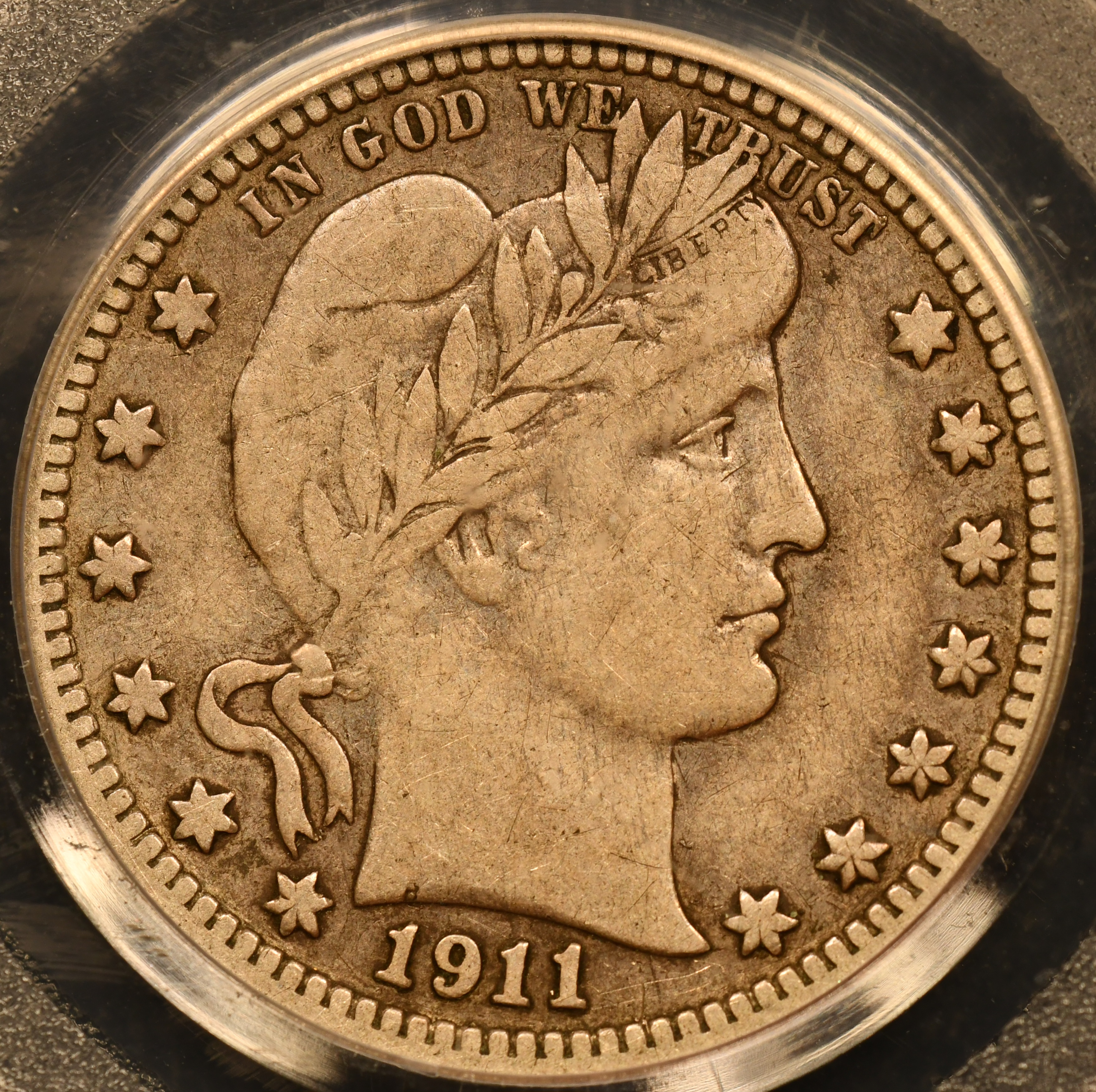
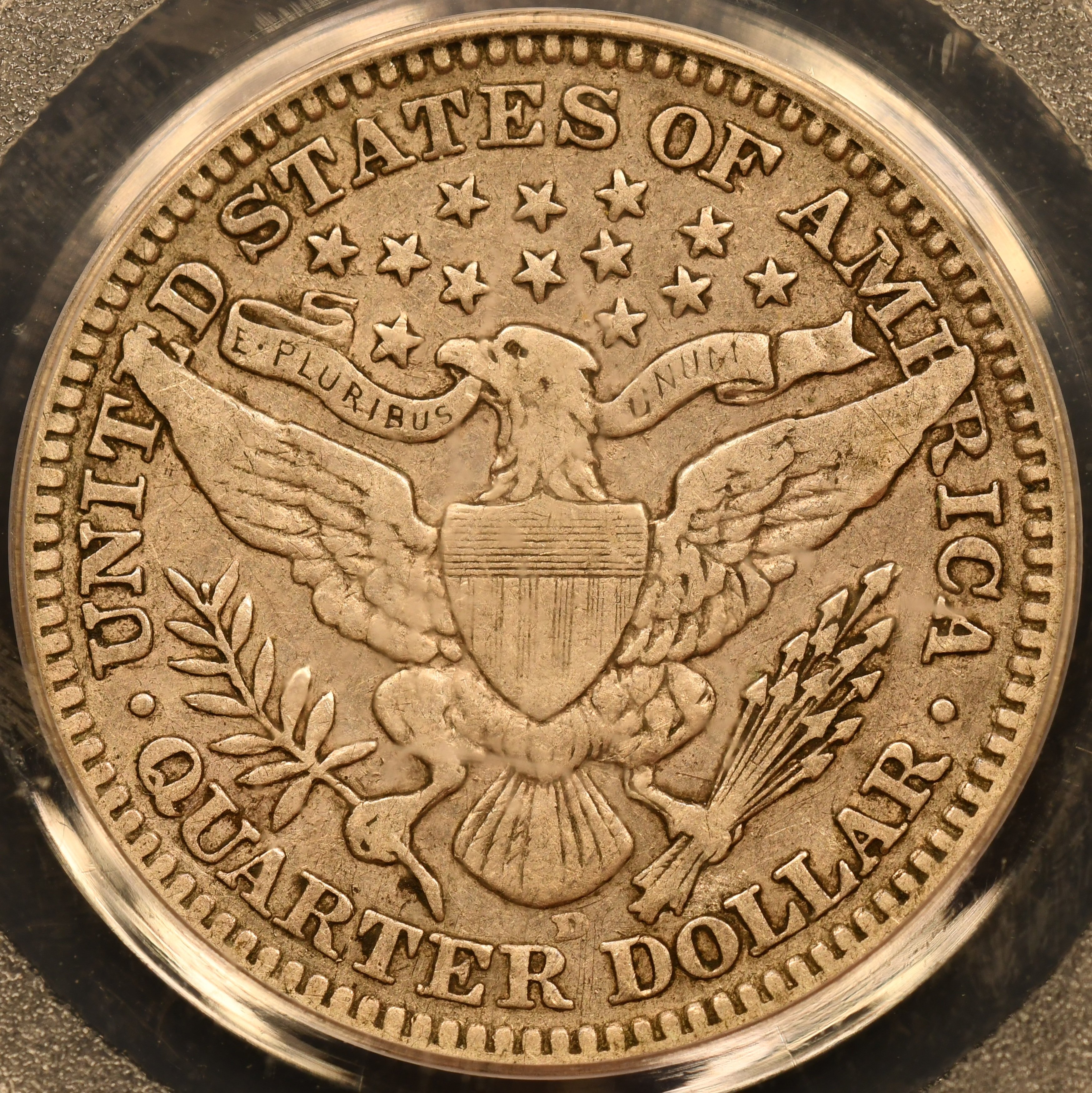
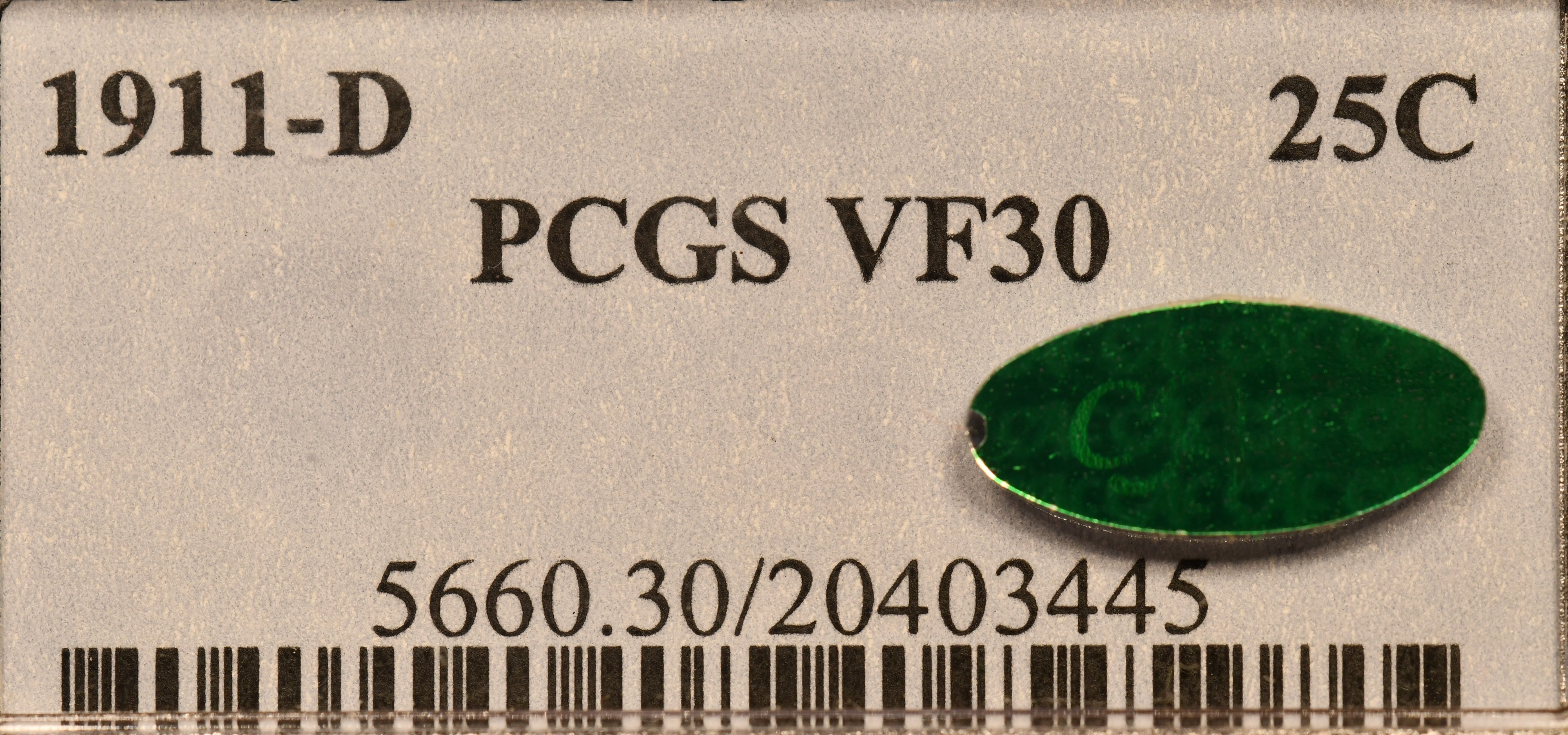
Provenance goes to Al at Desert Moon Numismatics. He has some cool BQ's left last time I checked in: desertmoonnm@yahoo.com
A Barber Quartet is made up of Nickels, Dimes, Quarters, and Halves.
Tim - I look forward to seeing more of your ANA pick-ups!
Dave
Ok Dave, here we go...
1907-P Barber Quarter PCGS XF45 CAC
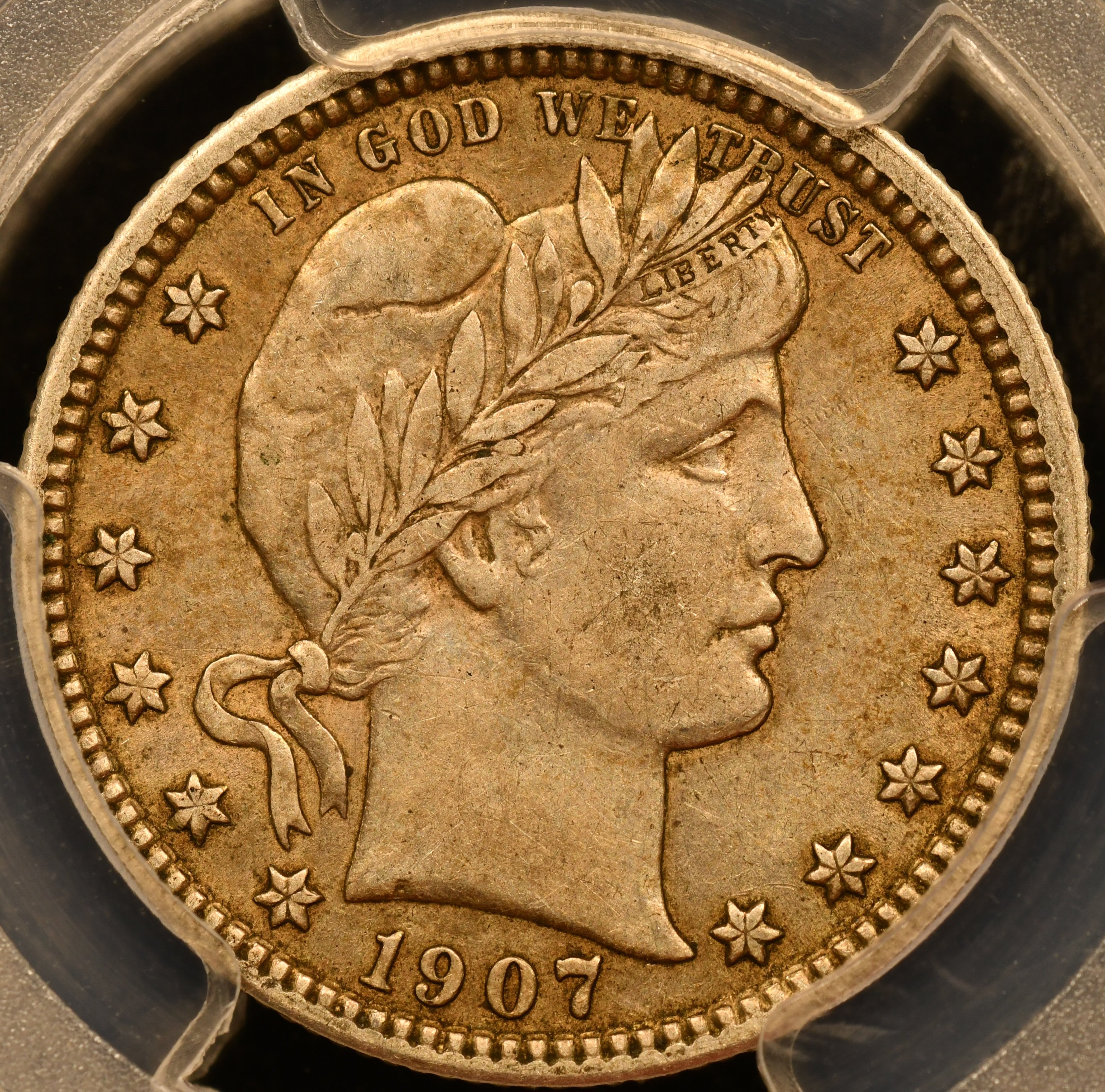
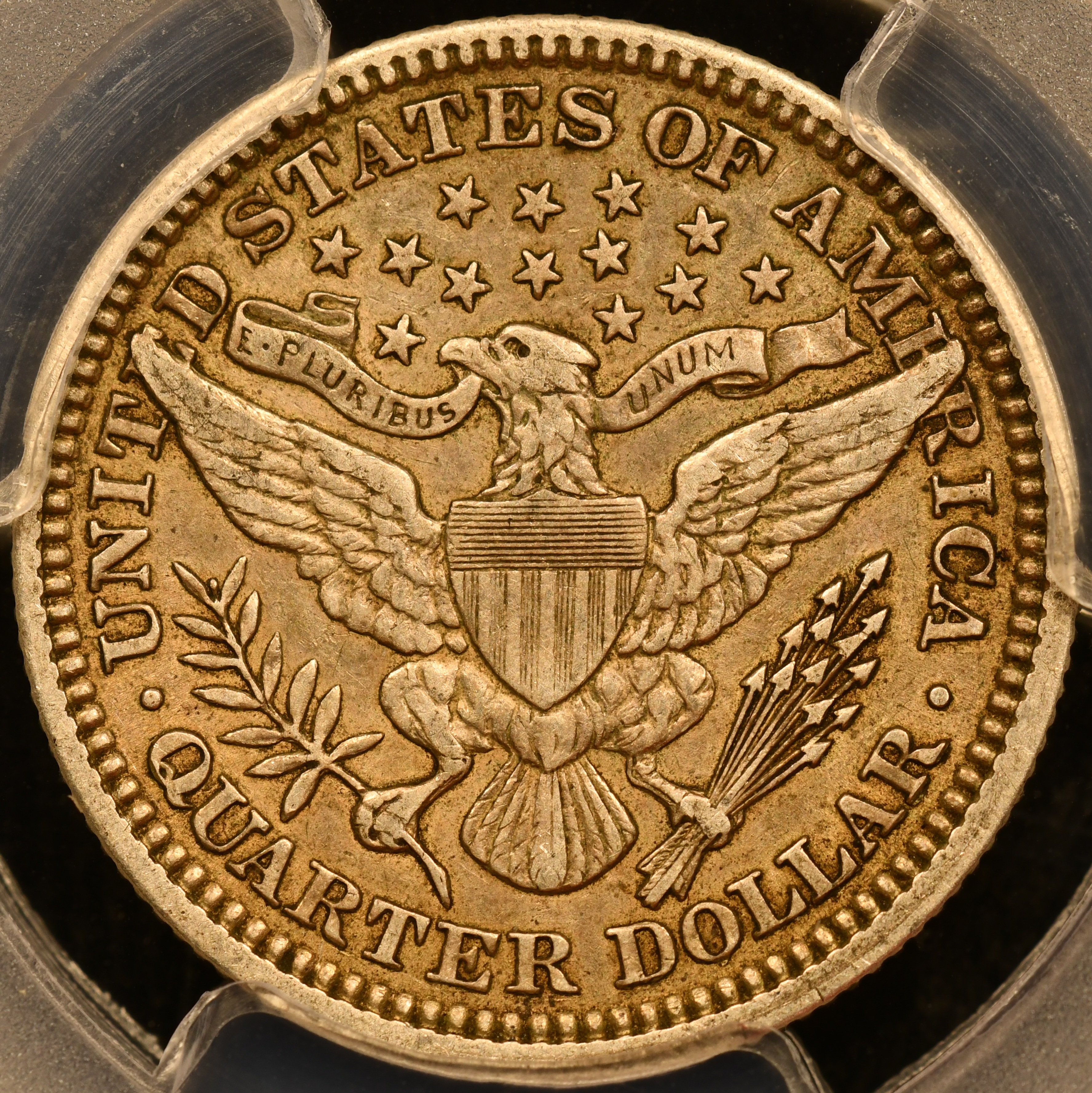
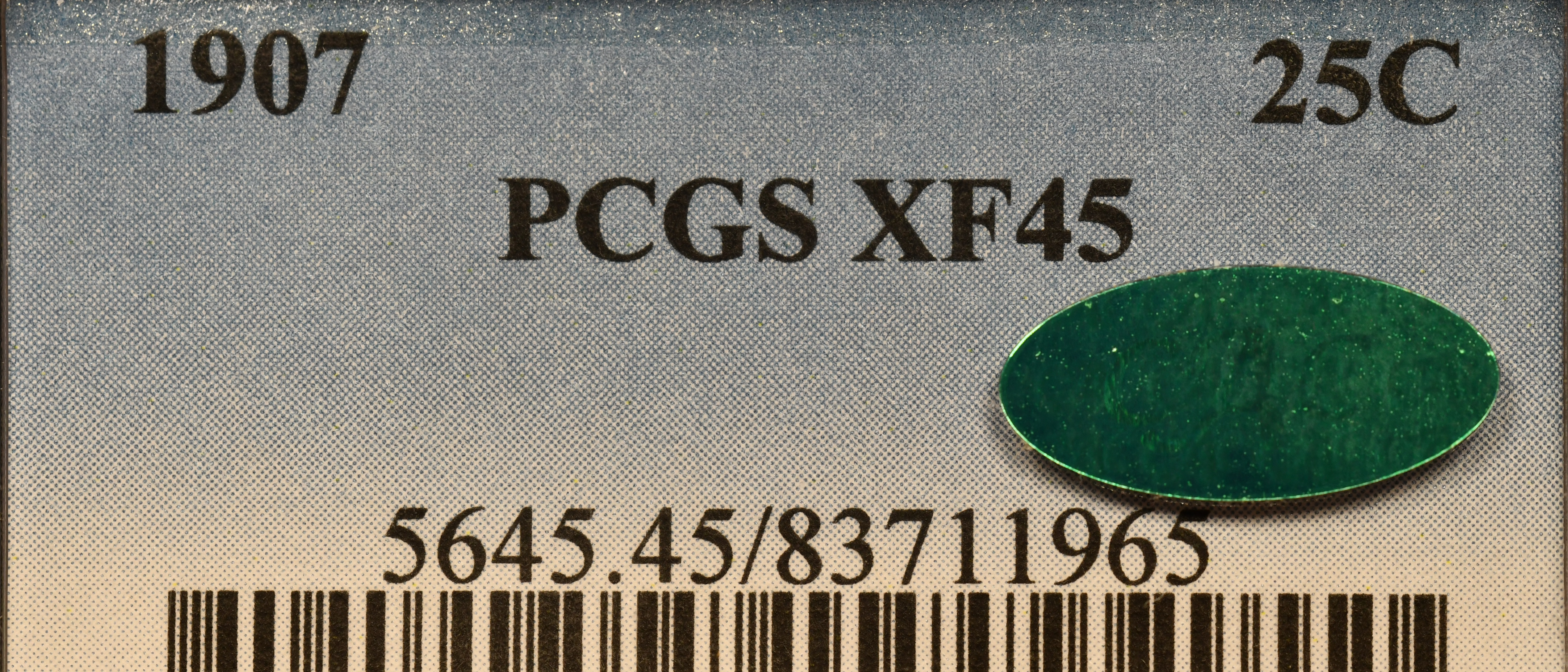
My comments: Actually tough to get common date anymore in the right grades like this. Thank you Al! @Desert Moon
A Barber Quartet is made up of Nickels, Dimes, Quarters, and Halves.
This was one quarter I wasn't planning to obtain going in... but then I saw it in person! Wow.
1910-D Barber Quarter PCGS XF40 CAC
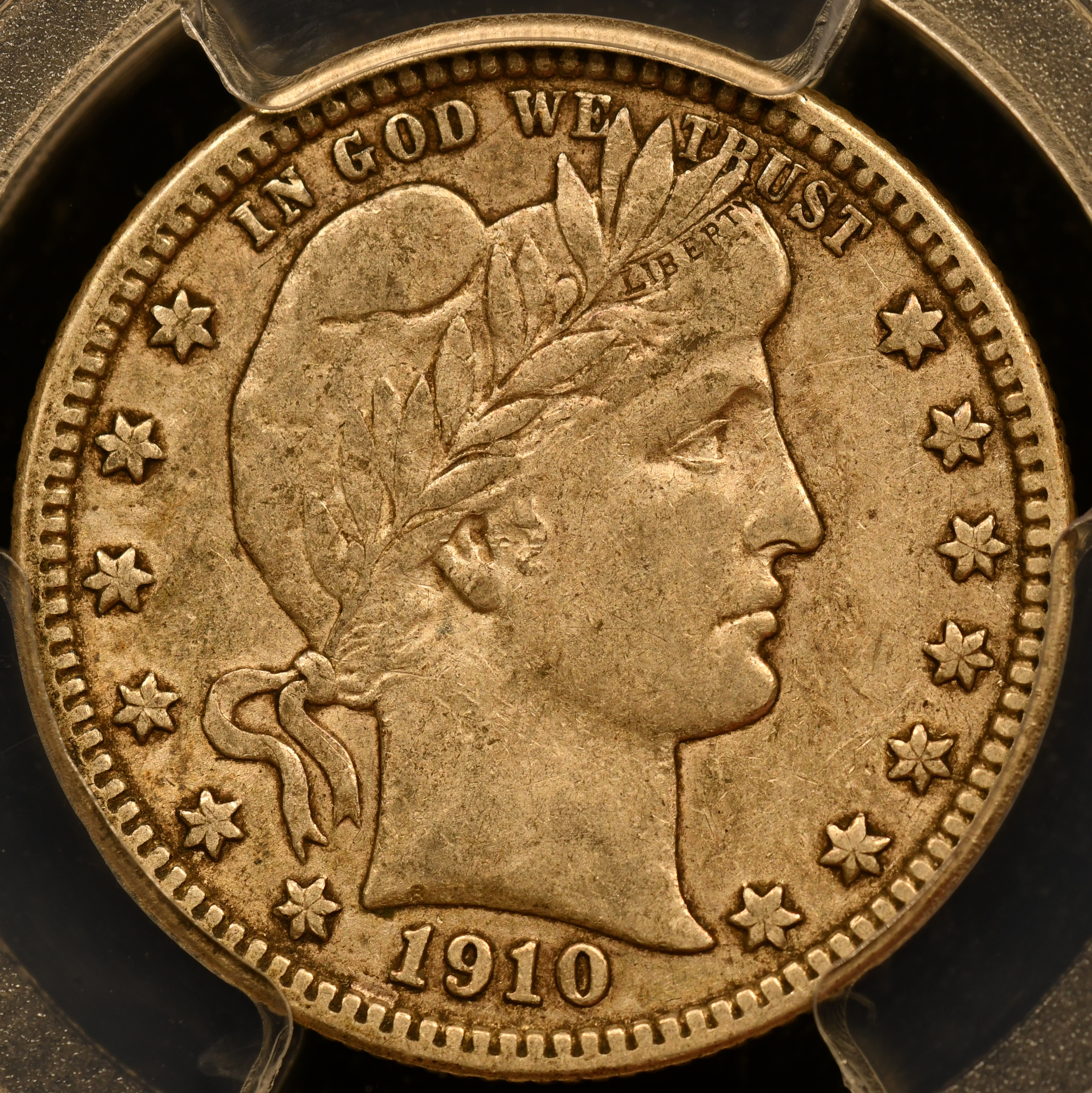
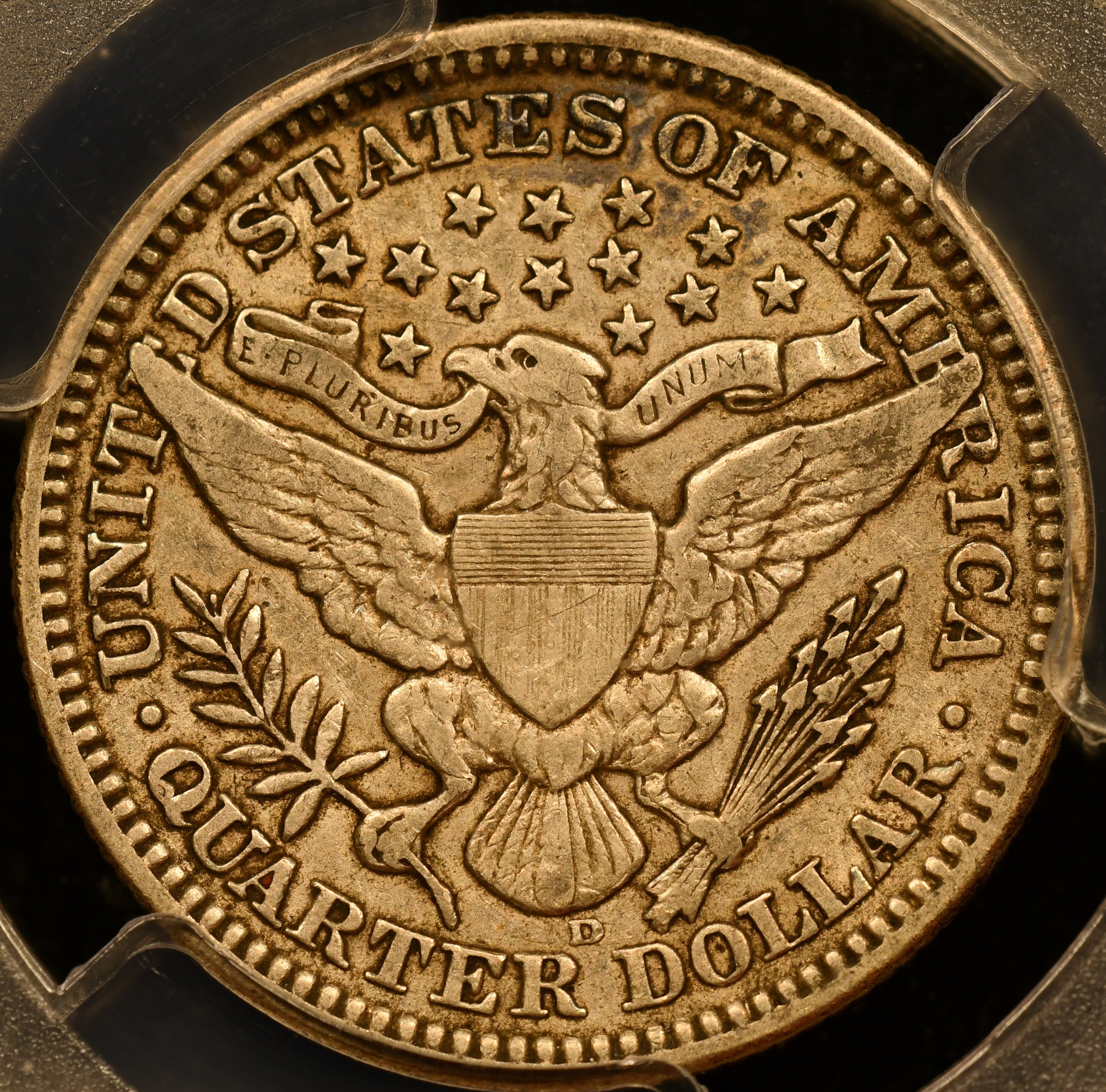
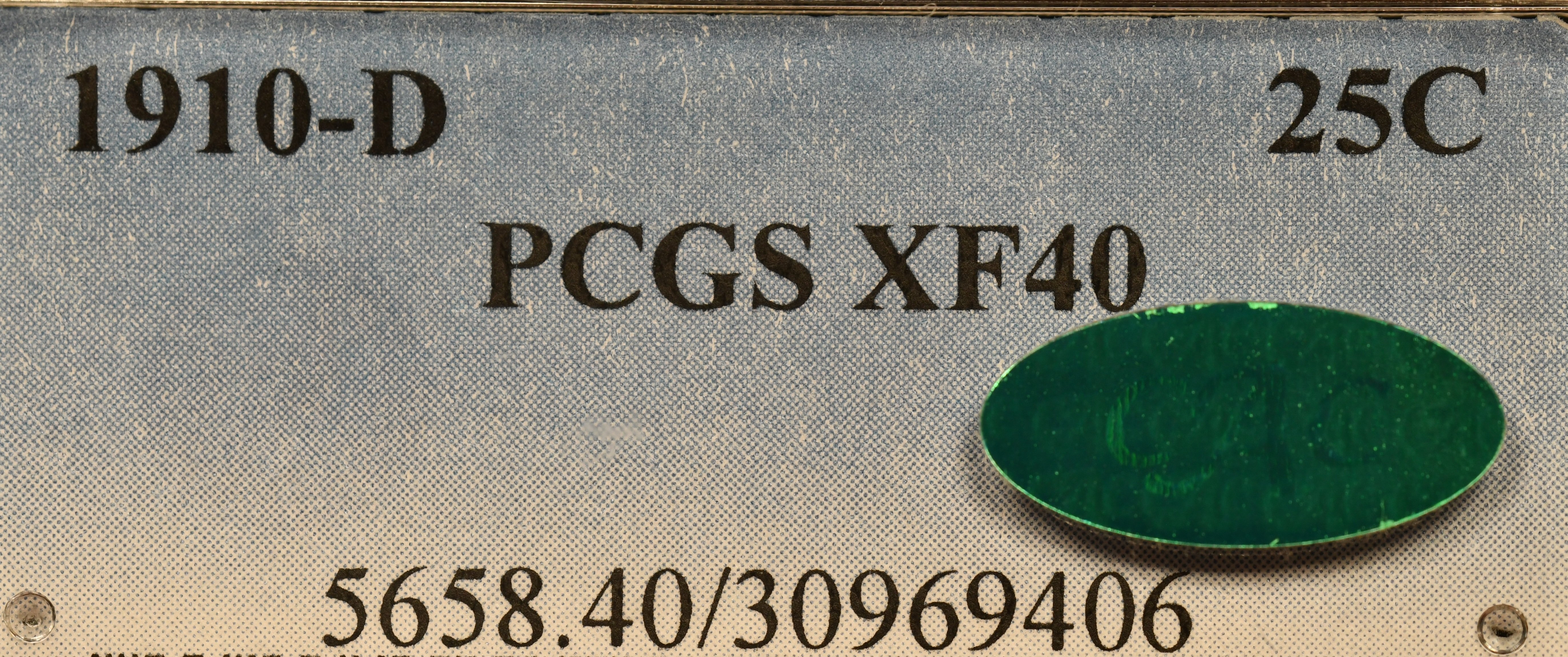
@Dave99B Dave, another one for you!
A Barber Quartet is made up of Nickels, Dimes, Quarters, and Halves.
Both gorgeous Tim. I really like both…..I found that 10D to be a tough one to find without problems (or just being generally ugly). Yours is as nice a VF/XF as I’ve seen.
Great pickups!
Continuing on with my OKC ANA newps, this one is a puzzle.
1914-P Barber Quarter PCGS VF30 CAC
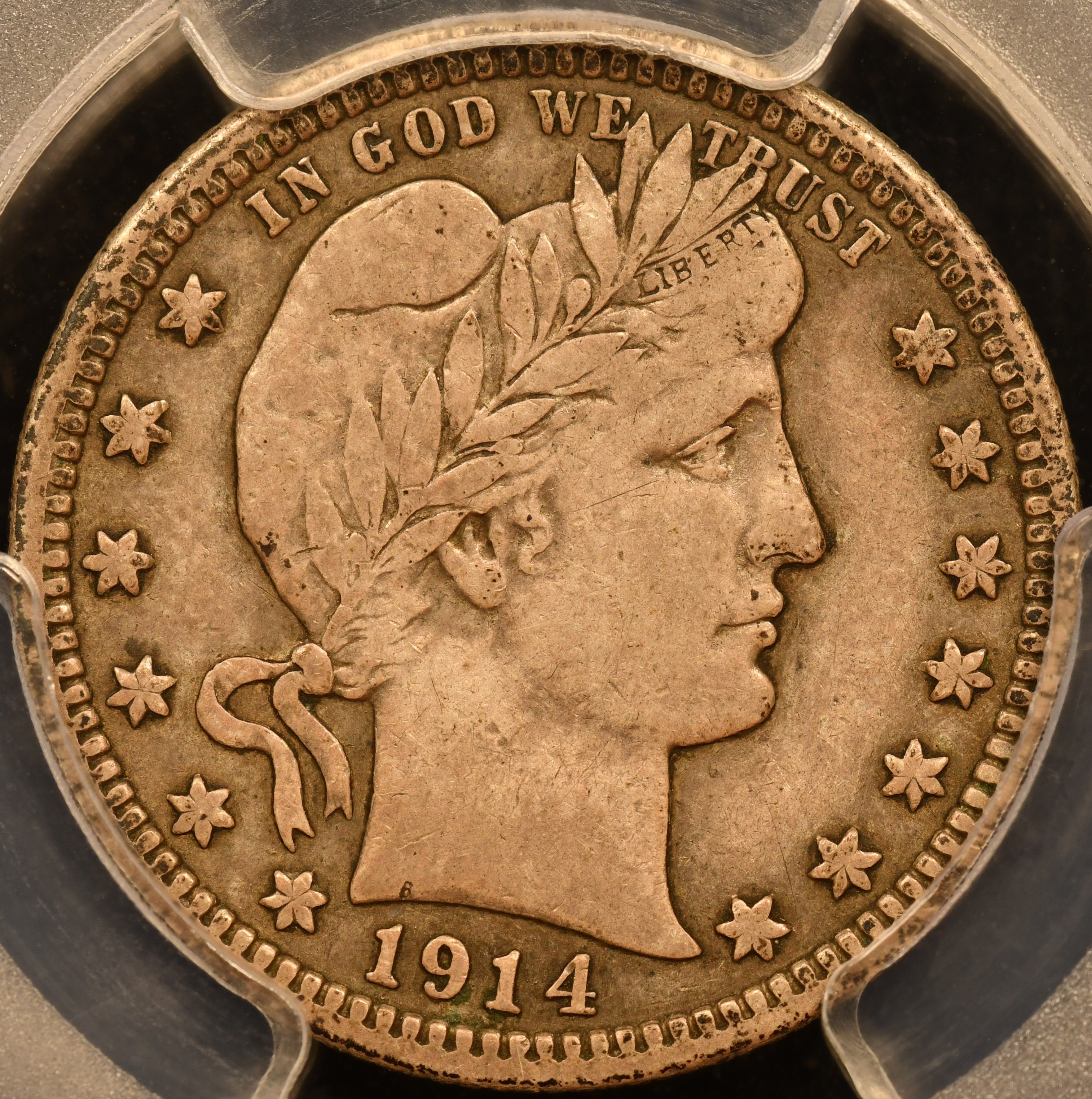
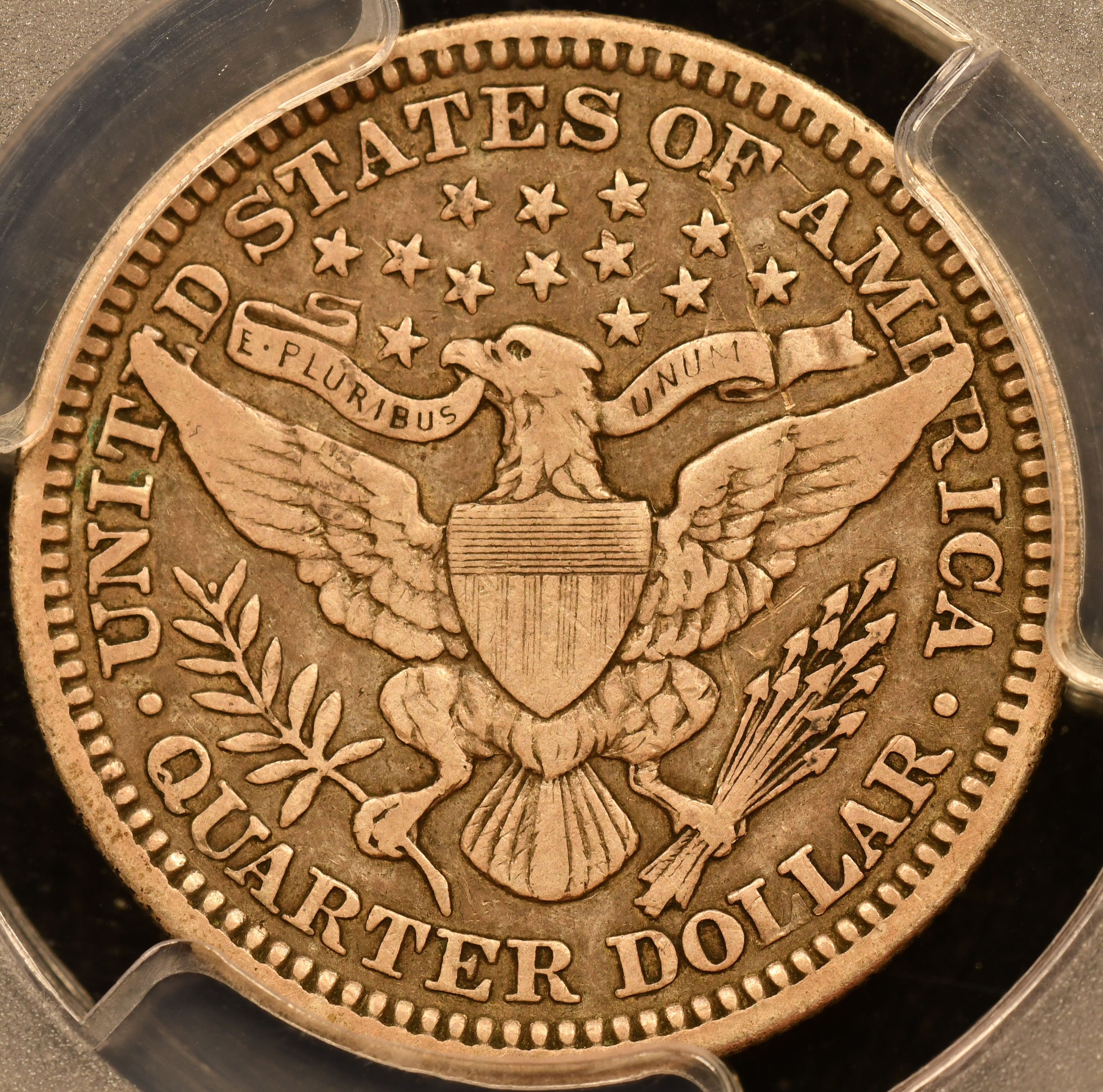
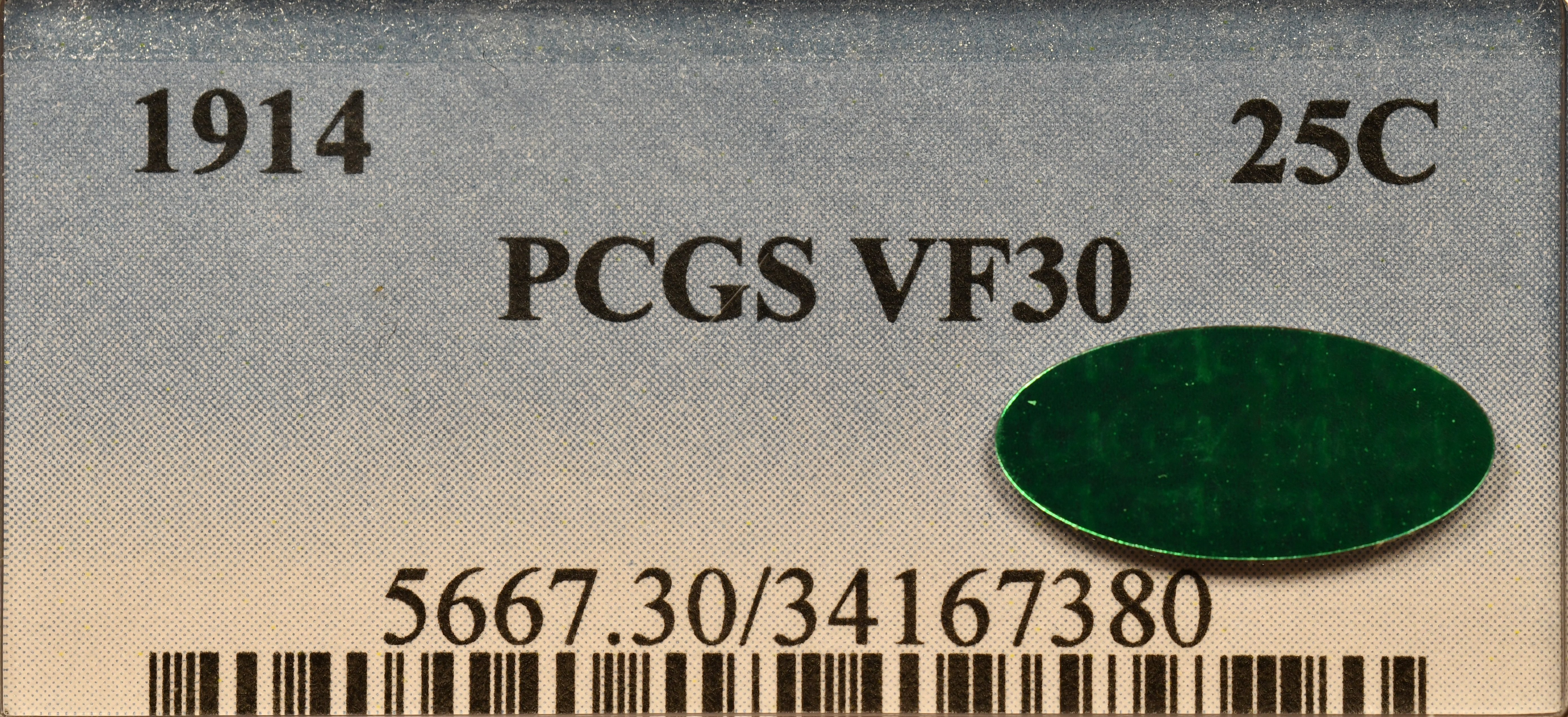
So what I want to know is my following '14-P with CAC seems remarkably more detailed than my new pick-up above. It clearly is a stark differentiator visibly when I look at the coin below vs. the previous newp above.
(1) why didn't the following 1914-P BQ PC30 CAC get a gold sticker? (or) (2) why didn't the following coin get a higher grade on the outset? suggestions on next steps?
1914-P Barber Quarter PCGS VF30 CAC #2
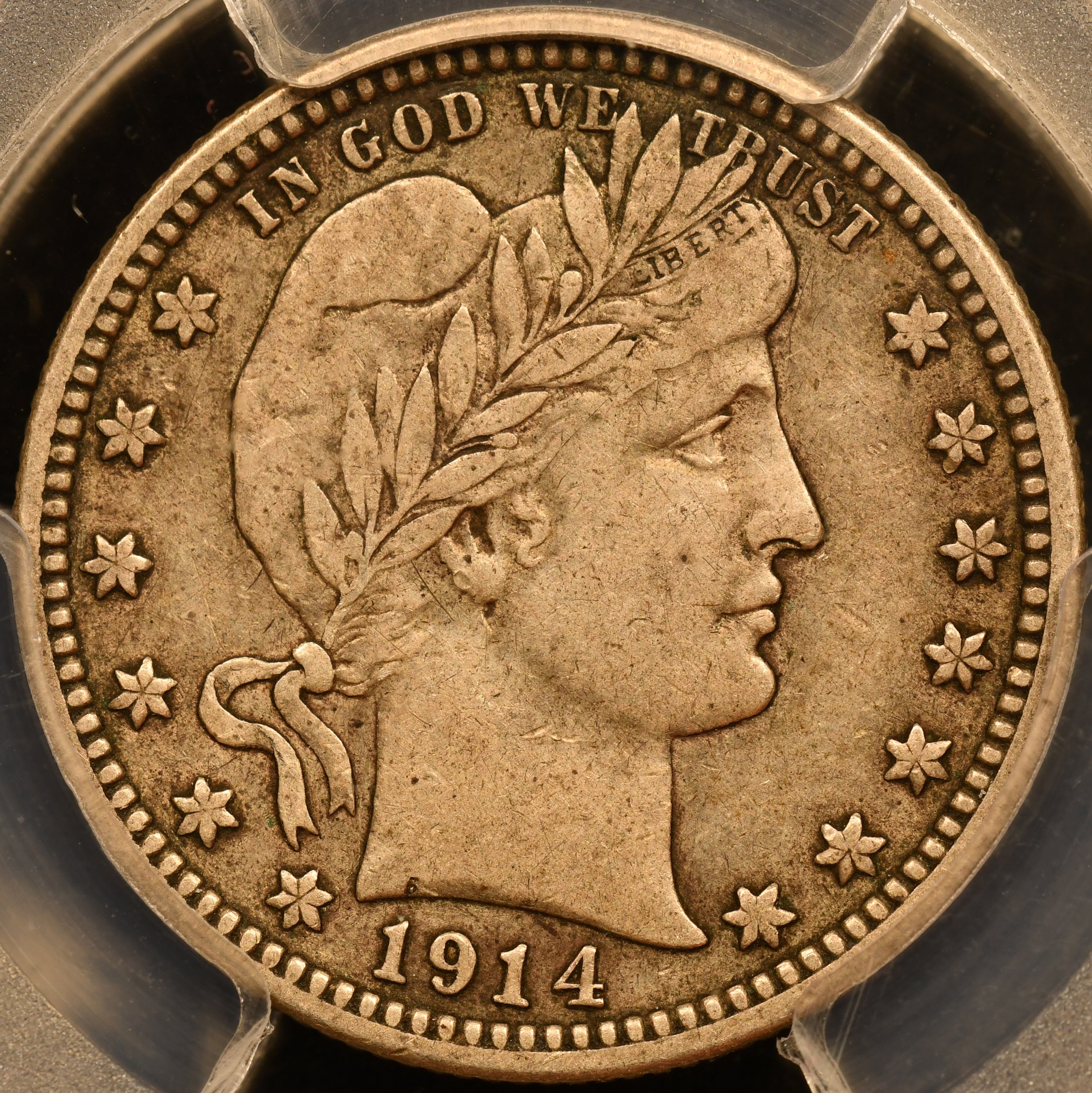
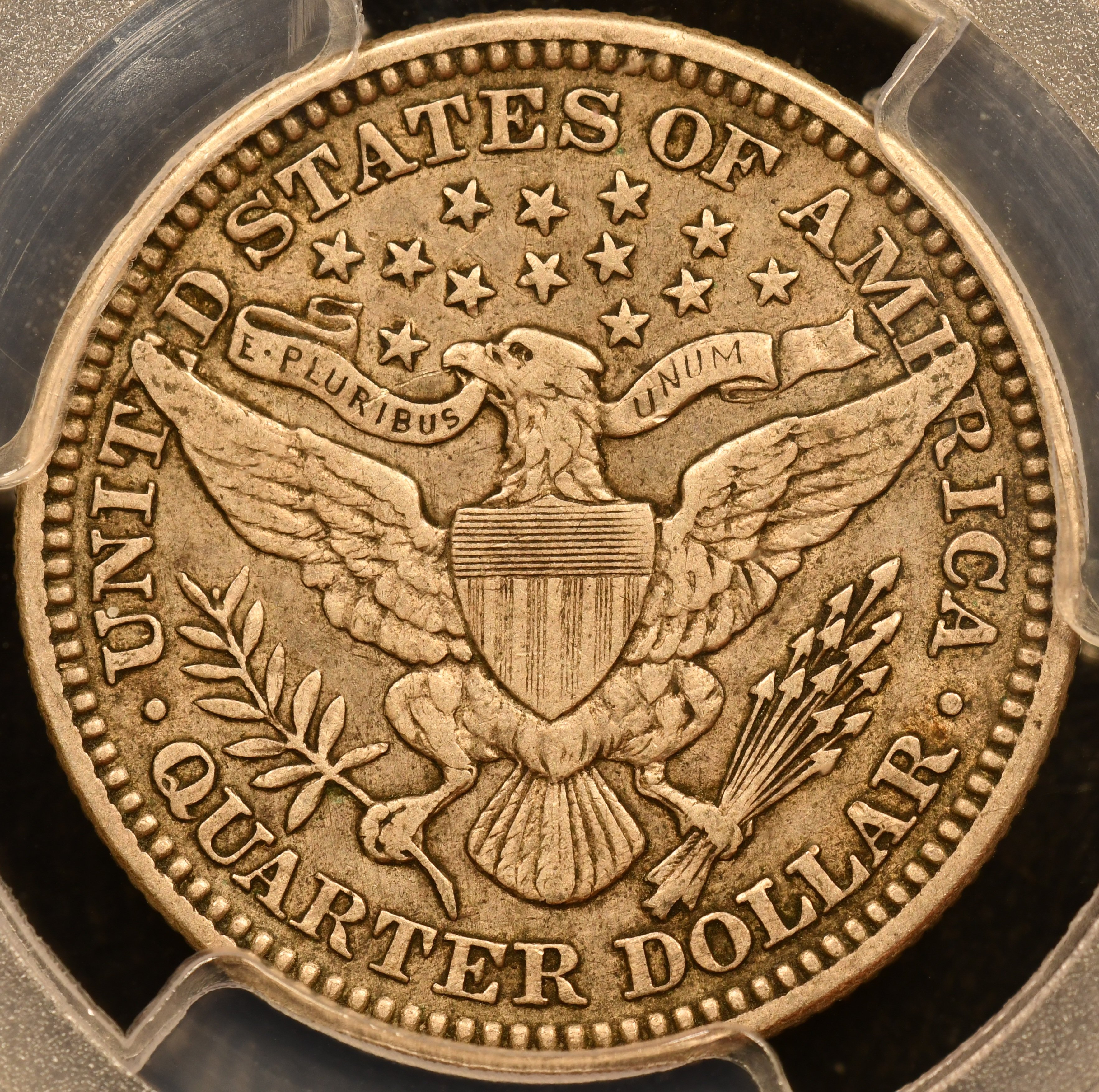
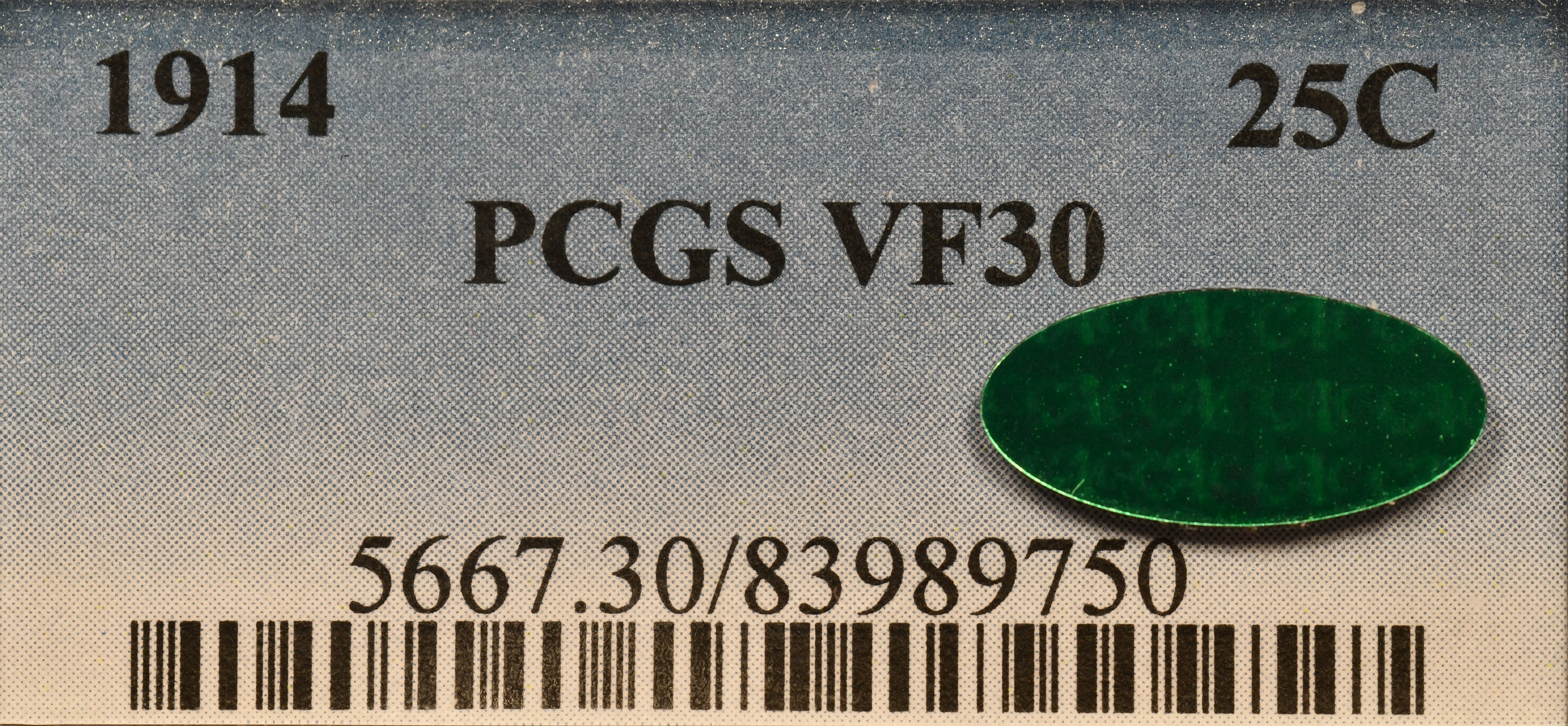
Edit: Oh, I didn't realize I have both CAC coins for the '14-P in VF30. We'll now we know they are both PCGS-holdered.
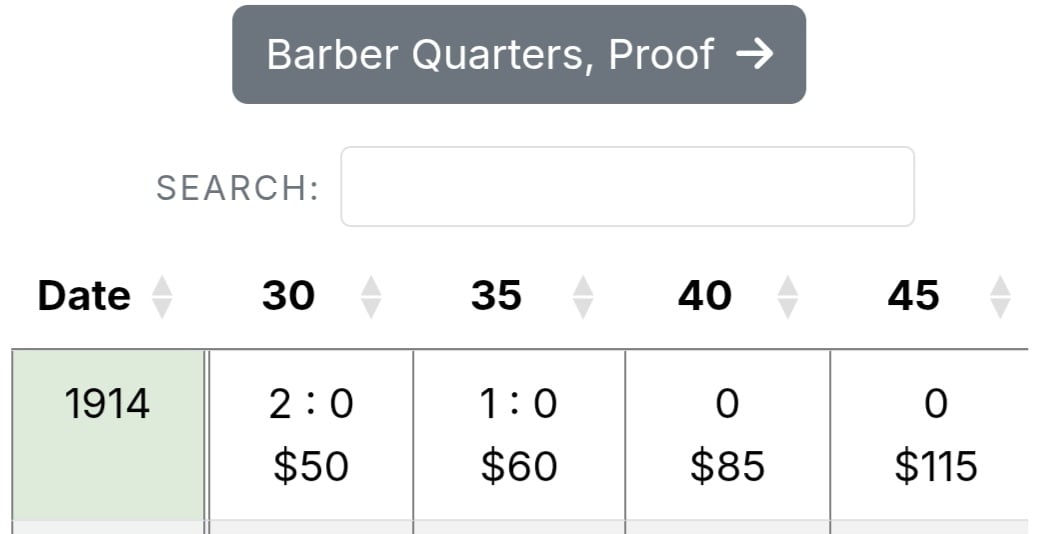
A Barber Quartet is made up of Nickels, Dimes, Quarters, and Halves.
My opinion- the first coin looks like a 29; not quite a 30. The second coin looks like a 39; not quite a 40. And yes, I know there aren’t 29 or 39 grades. I agree there’s a big difference between the two coins to show the same grade on the holder. But it seems futile to second guess the grading room- it’s not worth the $$ to try again.
Why no gold bean on the second coin? Maybe they ran out of them the day that coin went through. As good of a guess as any.
If the top coin was graded earlier (lower cert. number) versus the bottom one (larger cert Number) graded later on, if that's feasible a case of gradeflation...or tighter grading practices,IDK maybe that's the same thing
How about another bit of a change-up for today. This is from my LCS (local coin shop). It is a New Orleans Mint Barber Half Dollar. It has a lot of the original as-minted features on the reverse.
I am wondering if we can determine the date on the coin from the reverse characteristics? Looking at the O mintmark in both size and position... there even might be an ever-so-slight repunching... my first guess is a 1903-O Barber Half.
Thoughts?
Obviously I would rather have the coin as-minted instead of defaced for some initials and a button hook!
A Barber Quartet is made up of Nickels, Dimes, Quarters, and Halves.
Looks like it might have been an AU 55. I believe I can see an 1896 on the front.
Here is a '96 New Orleans half for mintmark position comparison.
Close-up of the button backside mintmark vs. the '96-O vs. a 1903-O (thank you to PCGS CoinFacts):
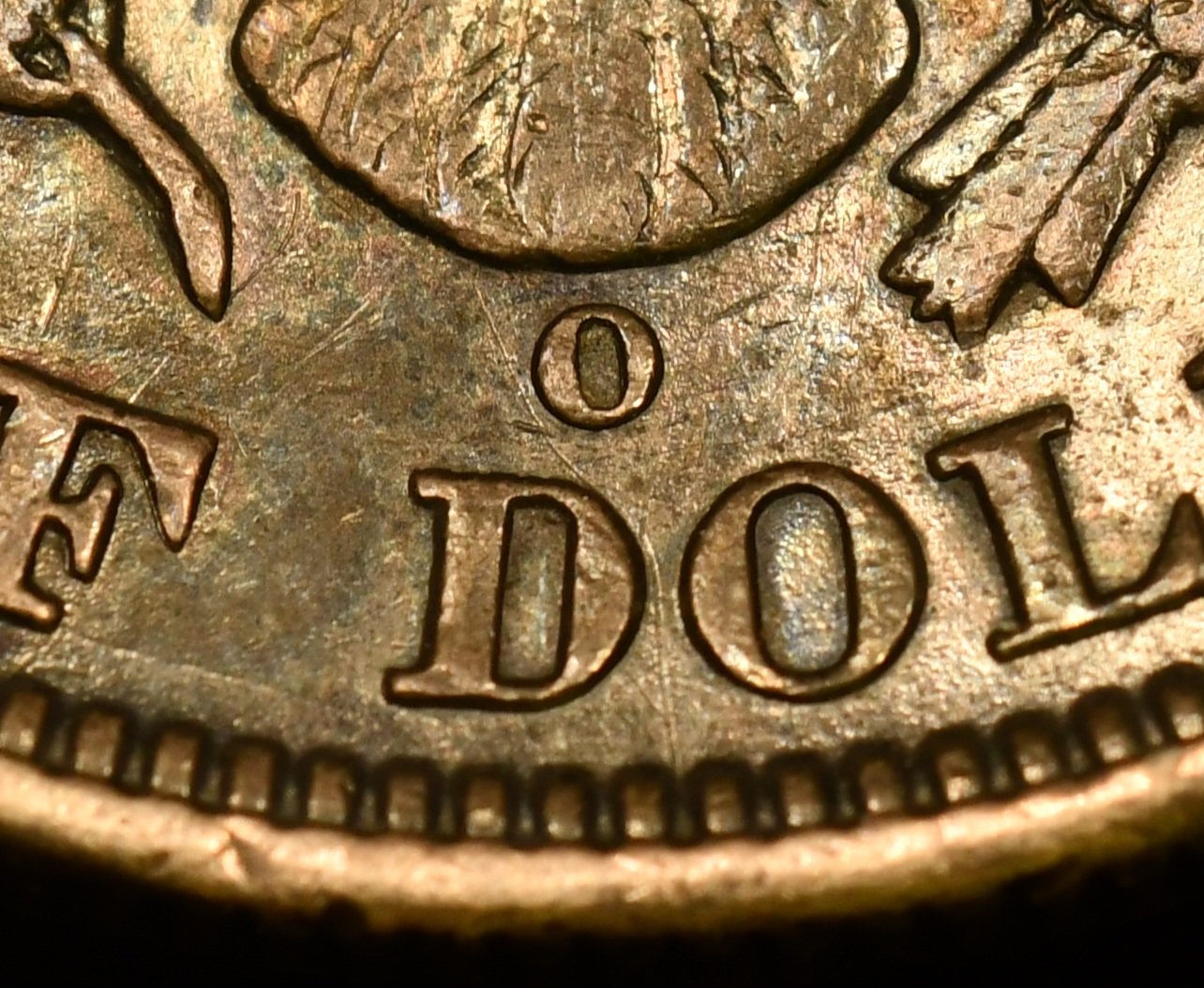
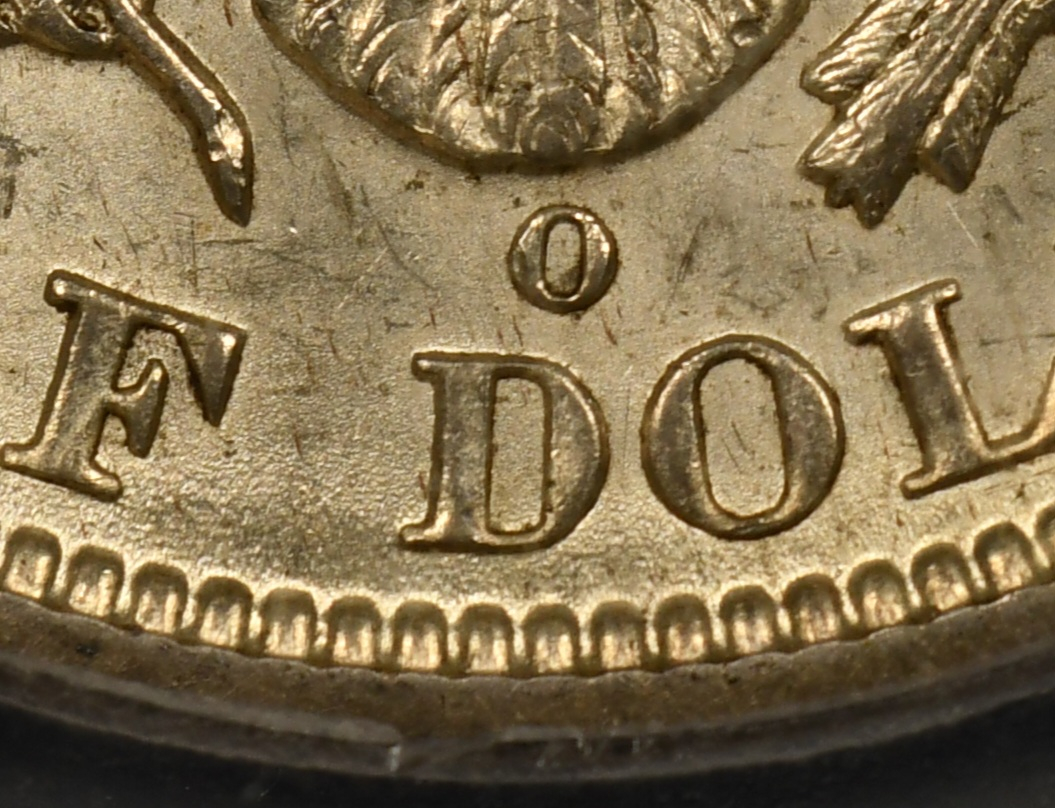
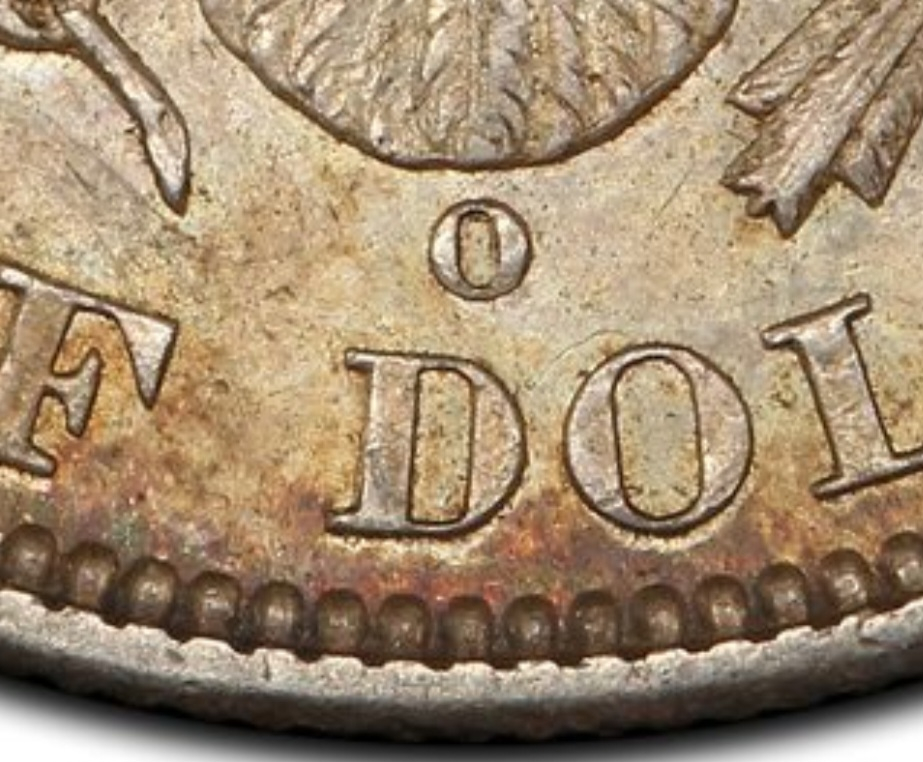
Seems like finding the right mintmark position for a date determination would be like trying to find a needle in the haystack thing.
A Barber Quartet is made up of Nickels, Dimes, Quarters, and Halves.
I’m fairly confident one could determine the date of your Love Token by the MM position, rotation, and depth. It would take a lot of time, however. That would be a great job for Ai.
Here’s the Barber dime currently in my 7070 set. Cracked it out of an NGC 58 holder about 6-7 years ago to put into my Dansco, then submitted the entire Dansco a couple of months ago.
Not an overly difficult date, but certainly a beautiful representative of the type to my eyes. Now PCGS 58.
Did anybody have luck with the recent fixed price sale of the Valkyries Collection of Barber coins at Harlan J. Berk?
It was practically sold out when it listed. For those interested in what they come up with from time to time, here is their link: https://www.hjbltd.com.
The same thing with DesertMoon's (Al B.)'s coin list at the OKC ANA show... his whole entire Barber Quarter with CAC Price list all sold immediately at his requested prices. Barbers are hot as an entire series! https://www.desertmoonnm.com
Here is the SOLD DesertMoon list:
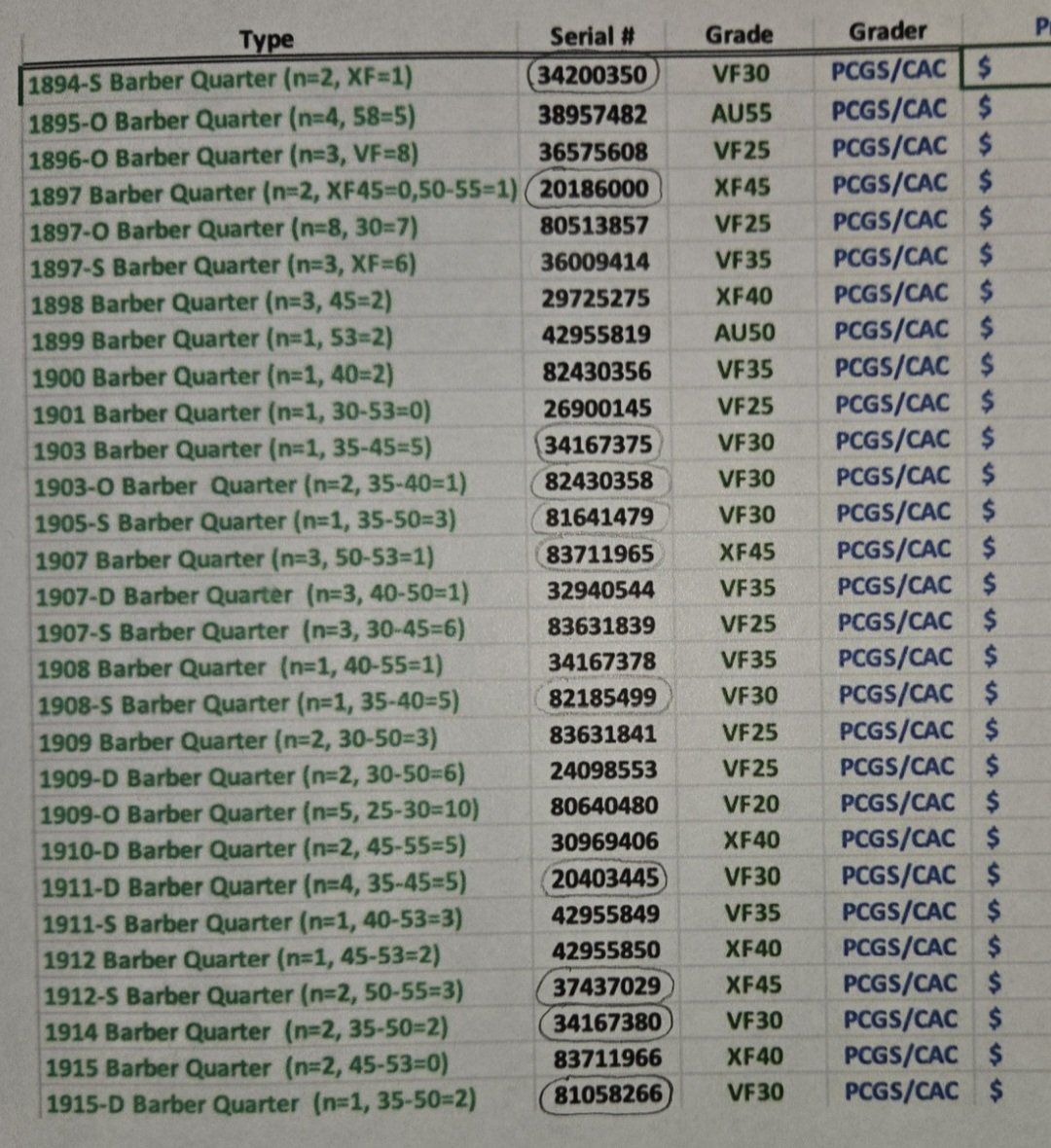
A Barber Quartet is made up of Nickels, Dimes, Quarters, and Halves.
Here is another OKC newp (@Dave99B):
1912-S Barber Quarter PCGS XF45 CAC
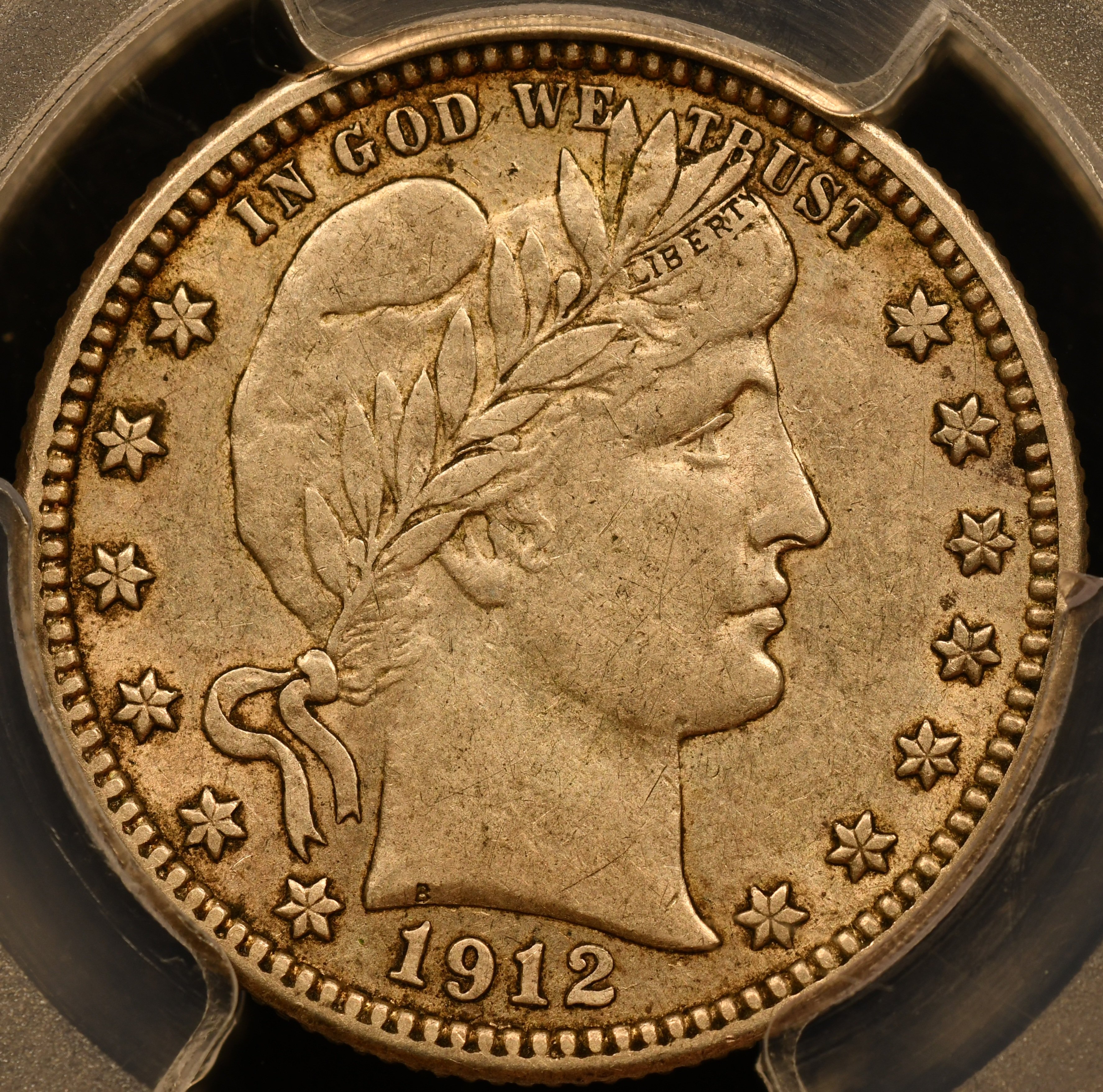
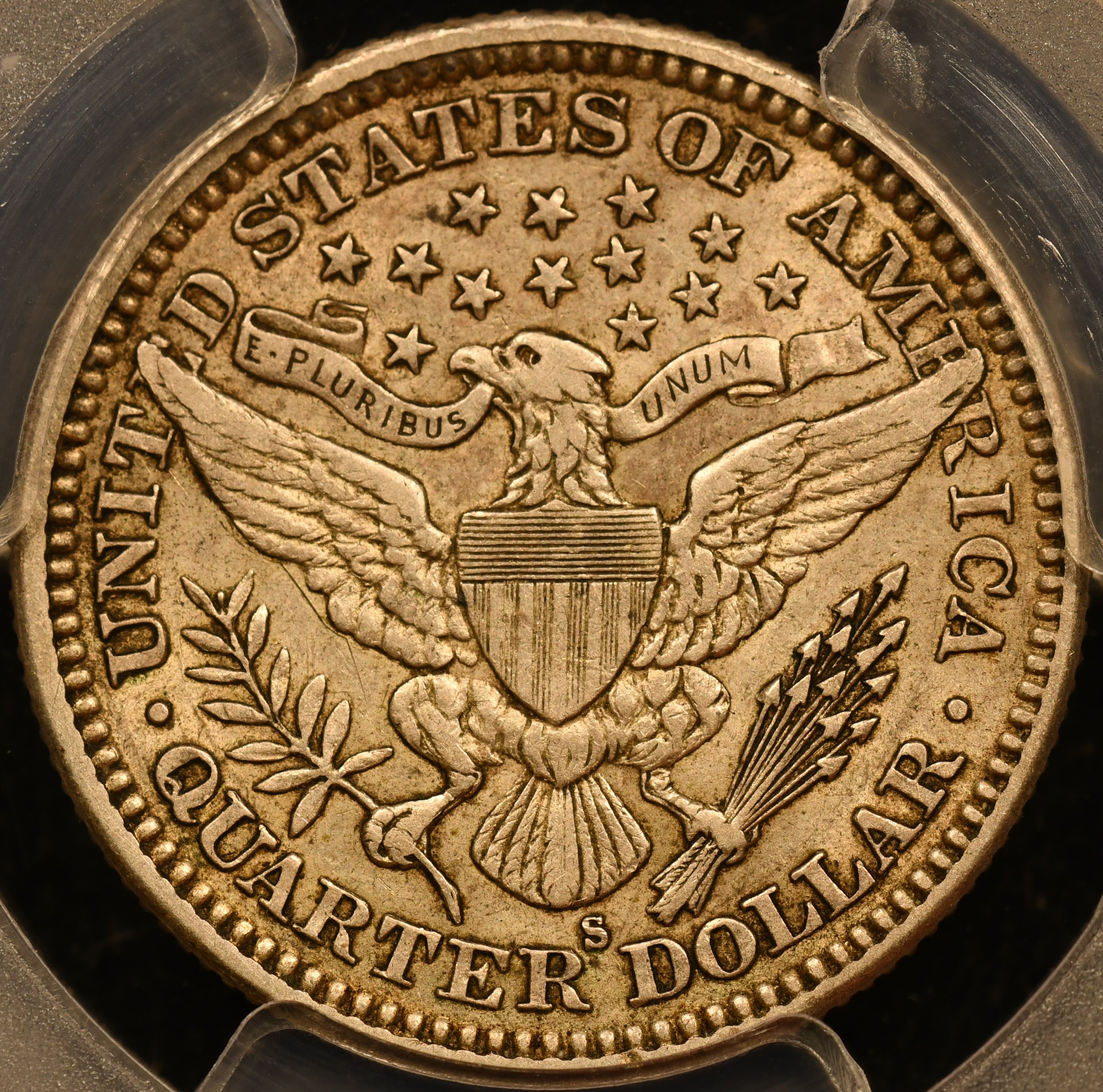
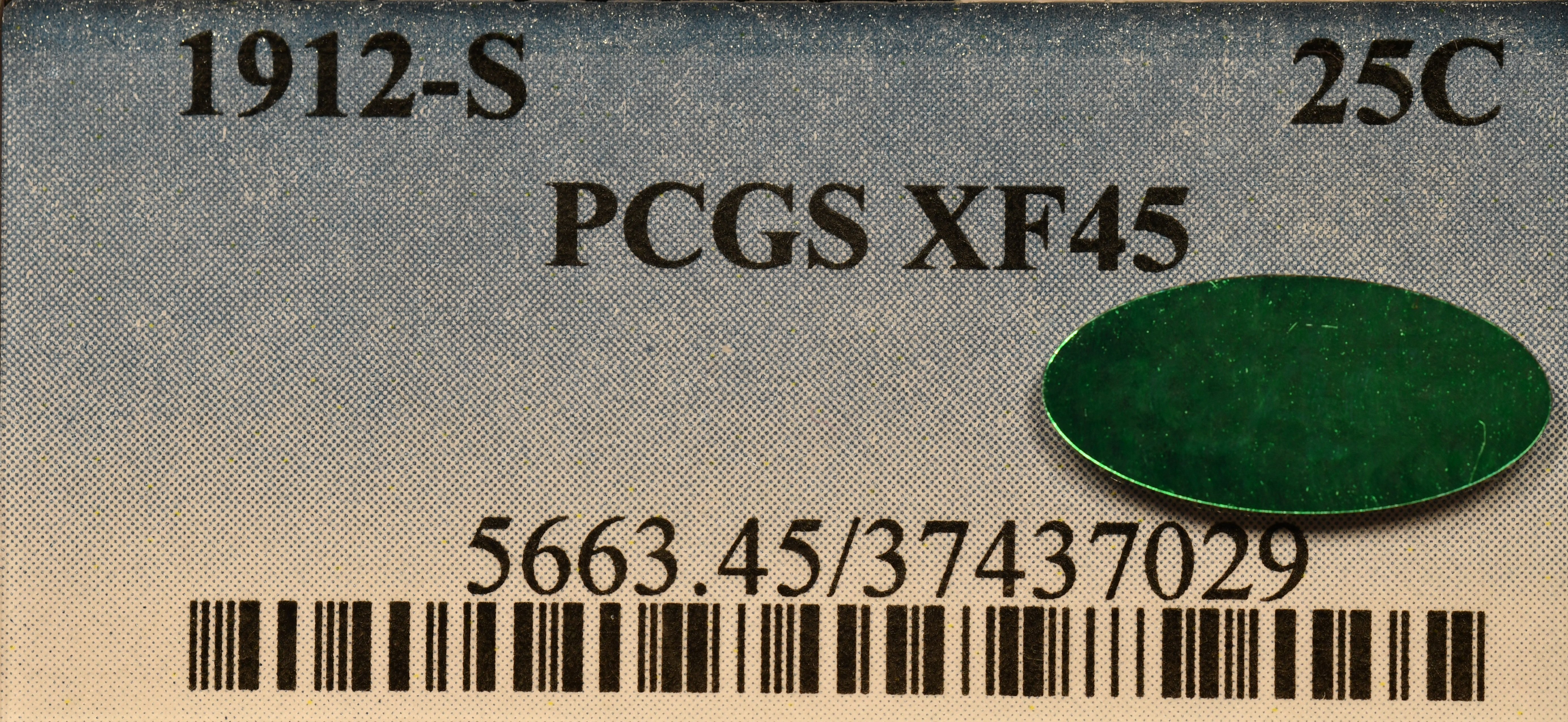
My comments: I haven't had an opportunity to look at the mintmark closely but there has been a discovery of a new S/S in the last year or two. It may be difficult to ascertain due to the gunk around the mm. There are a few scattered scratches in various places but the overall look is wholesome.
A Barber Quartet is made up of Nickels, Dimes, Quarters, and Halves.
Still haven't mastered the new phone but here is the PCGS graded coin - almost looks like some dirt left in the devices & maybe a candidate for conservation. I do like the date and mintmark however:
Well, just Love coins, period.
Overall nice coin and a tough date. I believe the dark spots are spot toning, not dirt. I don’t think conservation will help it. ( but I could be wrong be wrong).
Is it in an AU 55 holder?
Yes
Well, just Love coins, period.
Here’s my 1897 S BQ; kind of a similar look.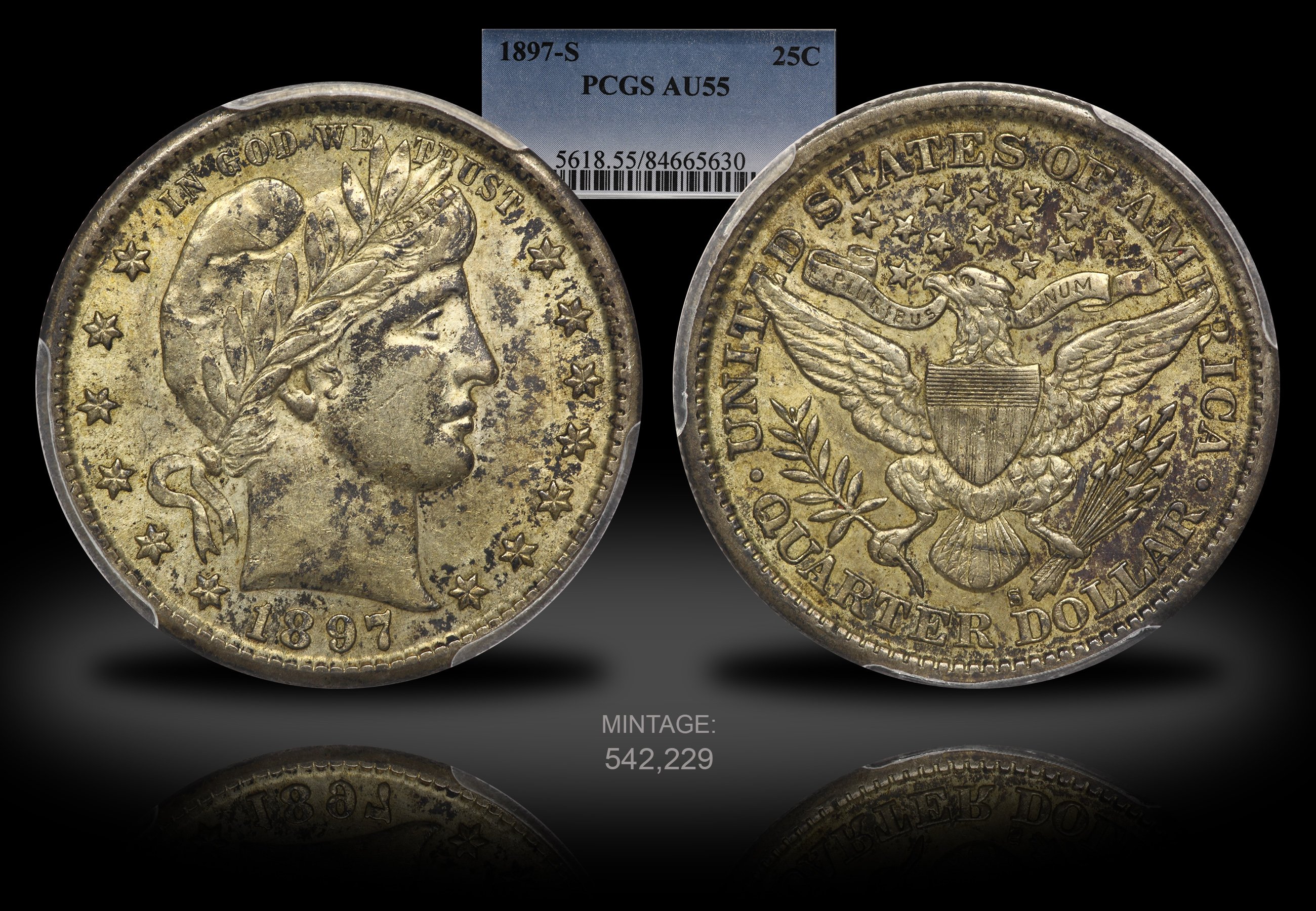
I'd have been tempted to conserve that one as well....
Well, just Love coins, period.
Here is my '97-S quarter. It is in PCGS as we speak for conservation... submitted at the OKC ANA. It is in some no-name PGA holder:
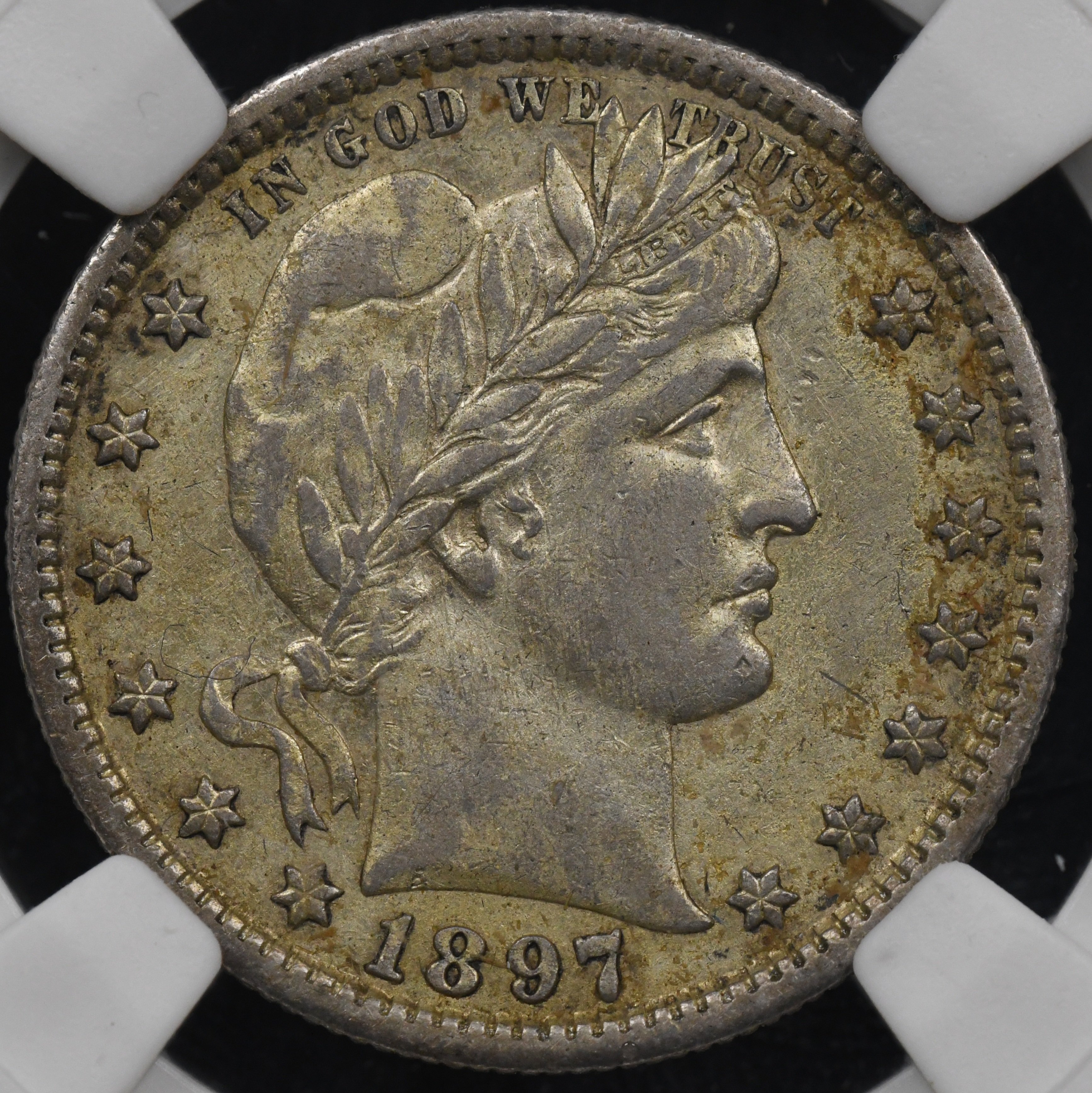
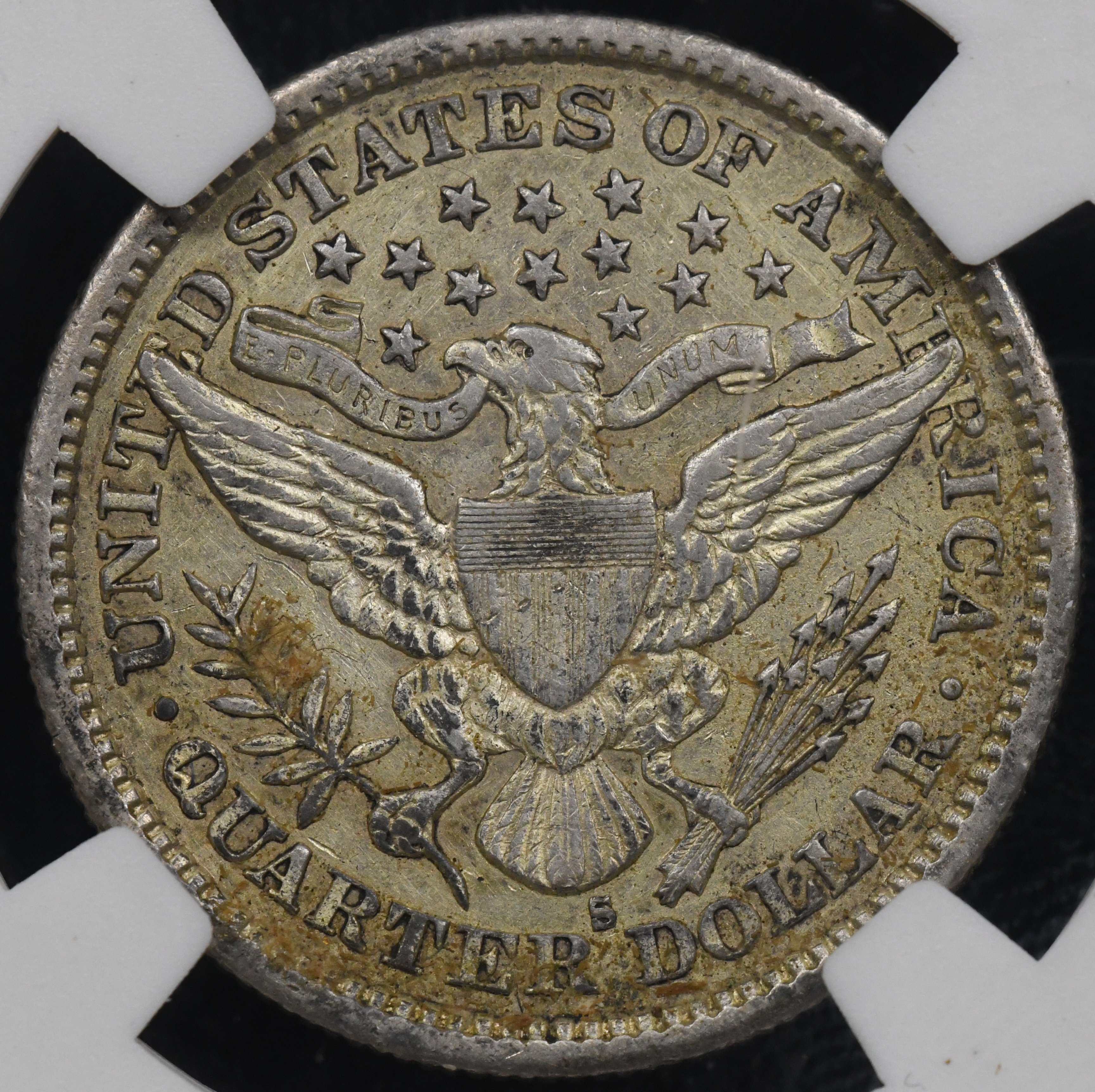
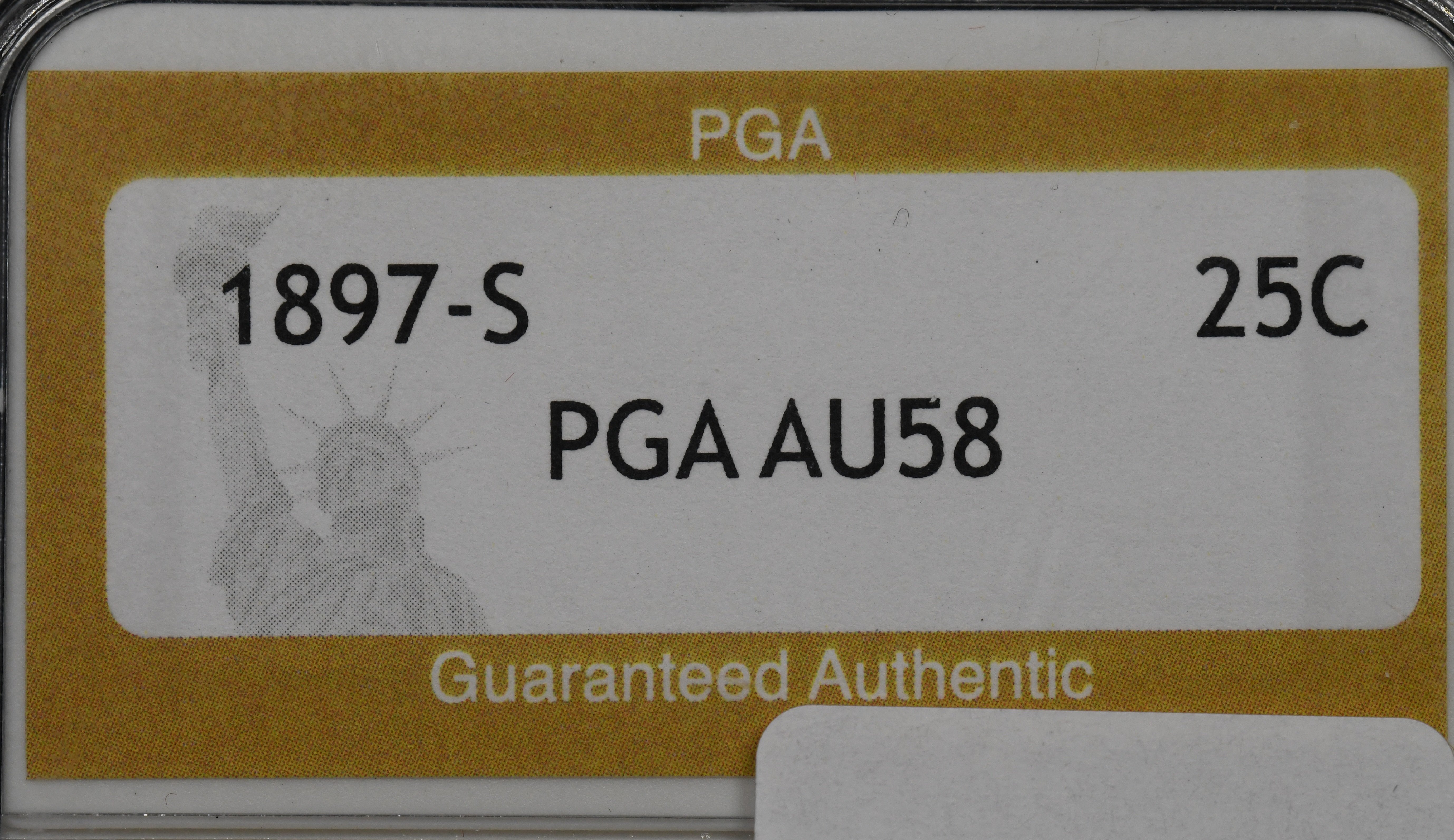
1897-S centered-S Barber Quarter PGA AU58
A Barber Quartet is made up of Nickels, Dimes, Quarters, and Halves.
@7Jaguars Like Jeff and you, my blotchy one is this '05-S:
A Barber Quartet is made up of Nickels, Dimes, Quarters, and Halves.
I’ll be interested to see if conservation helps any of these coins. My gut instinct is the dark blotchy tarnish is tough to remove.
@7Jaguars "I do like the date and mintmark"
A repeat showing of this '97-S Half:
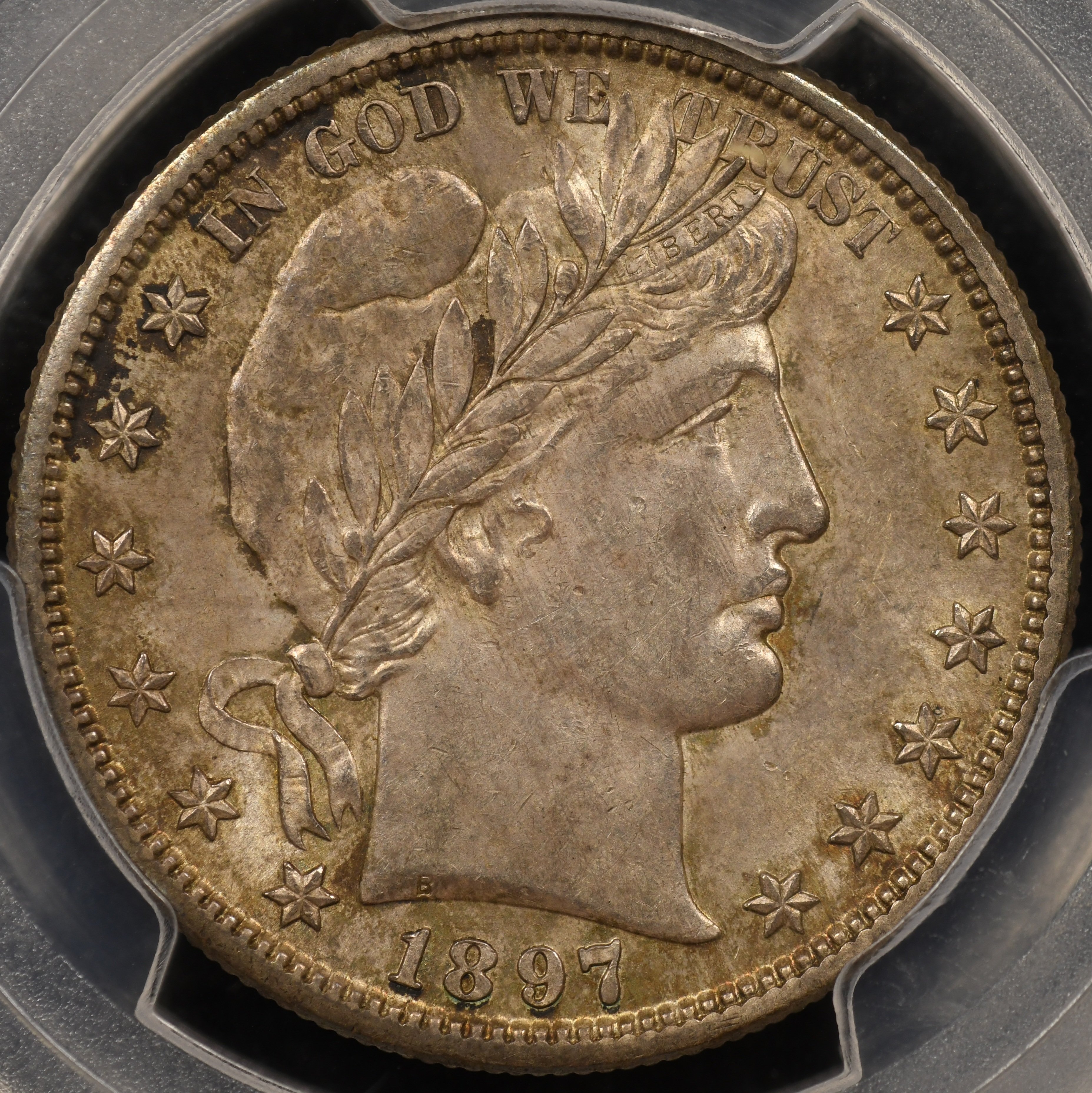
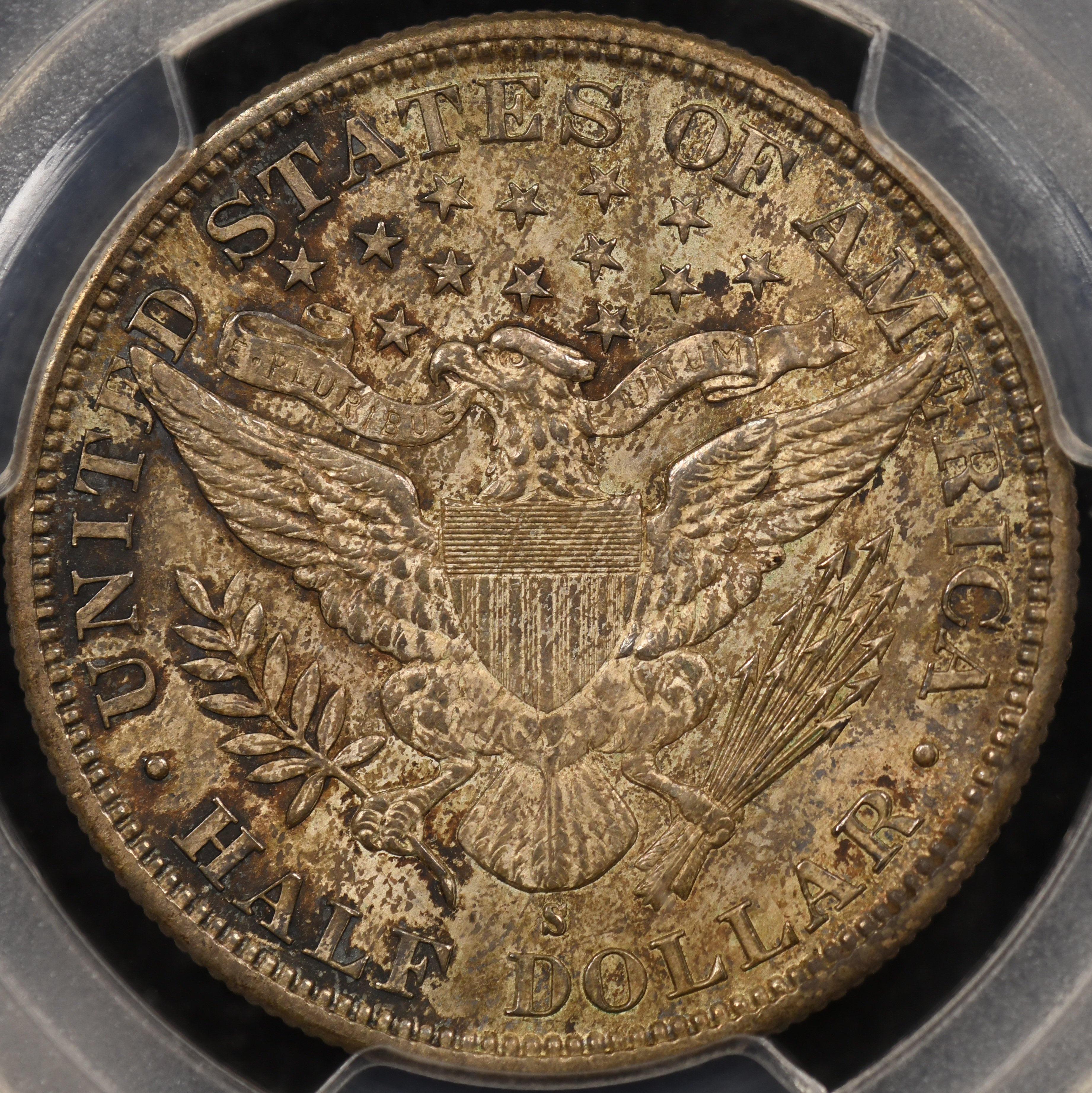
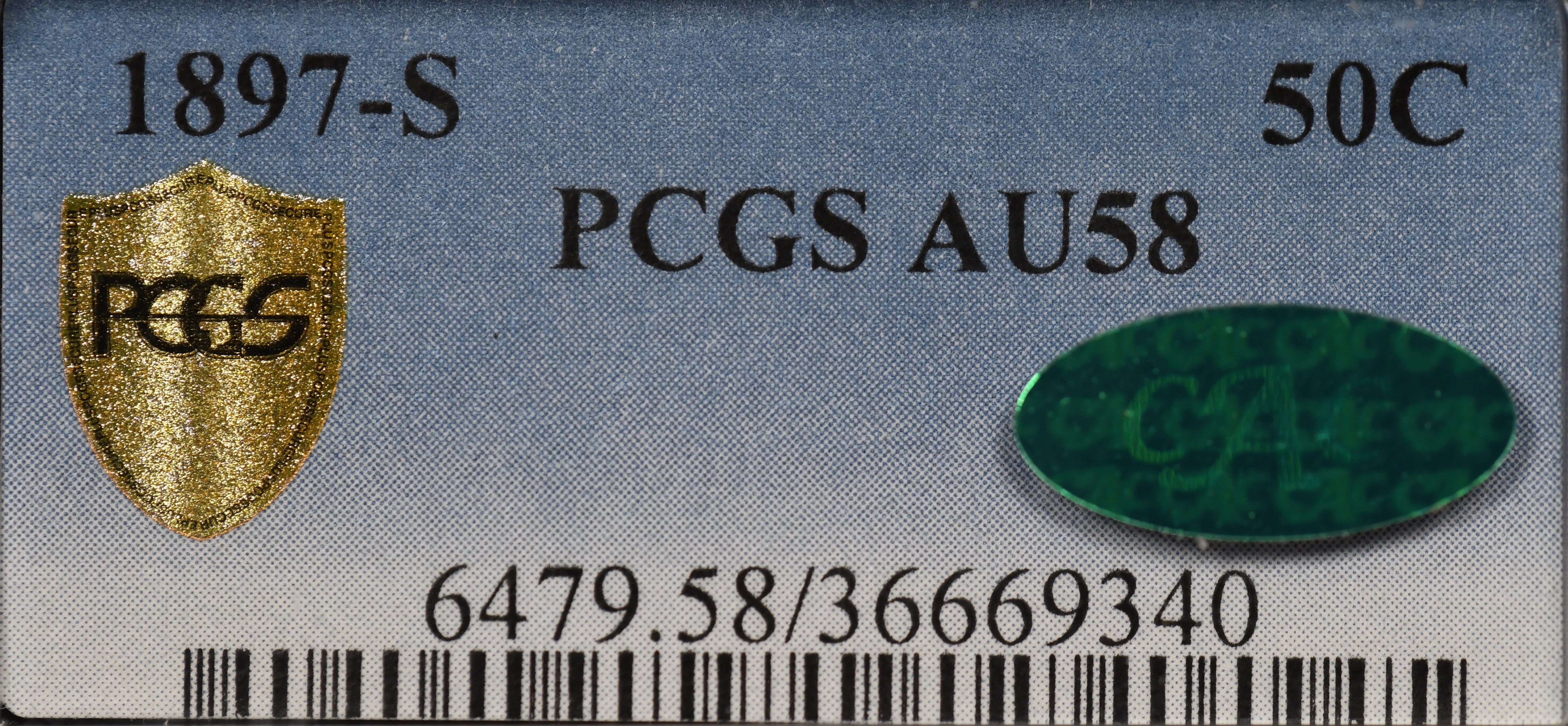
A Barber Quartet is made up of Nickels, Dimes, Quarters, and Halves.
Ok, here is another one of my OKC ANA newps:
1905-S Barber Quarter PCGS VF30
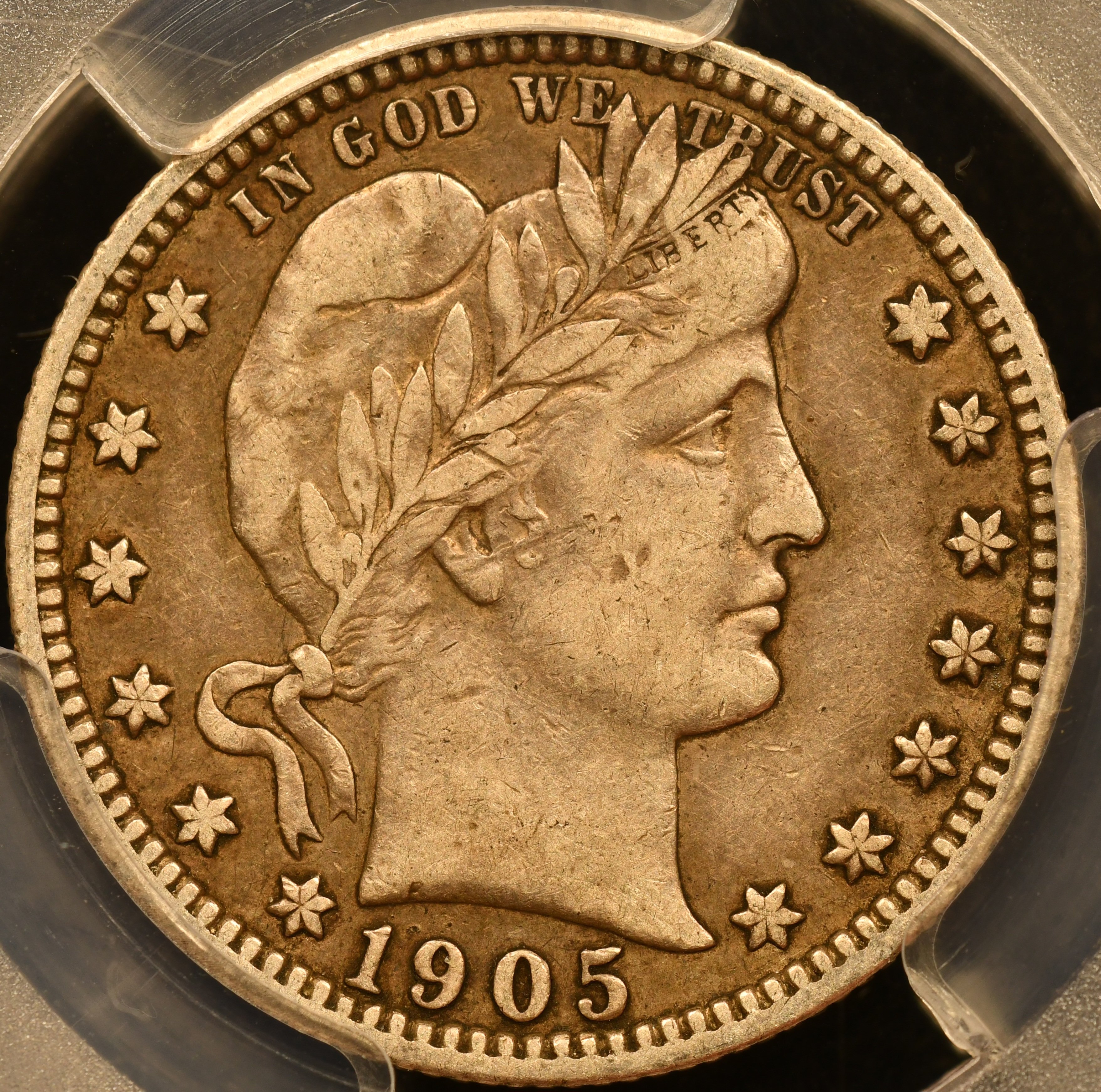
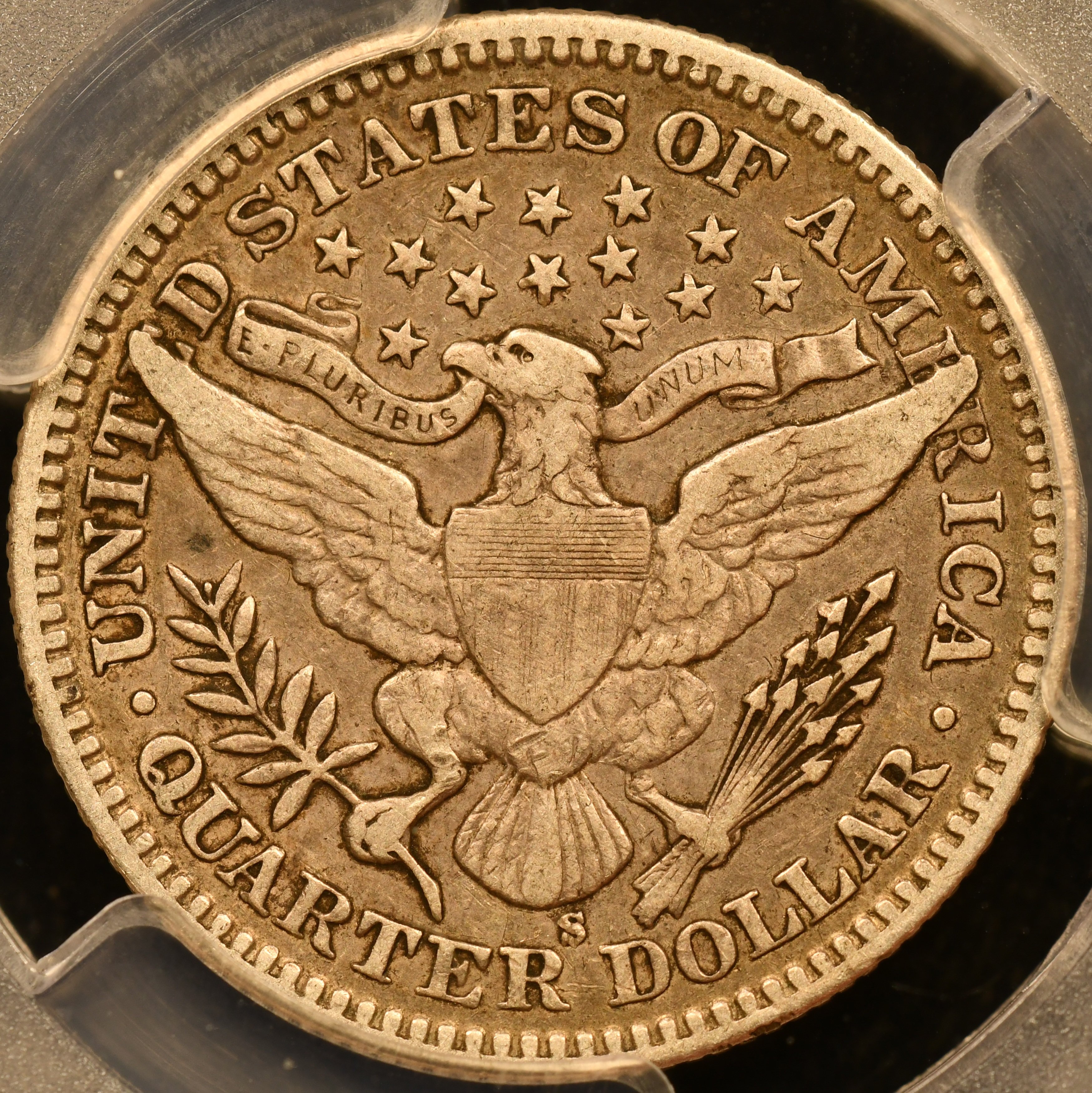
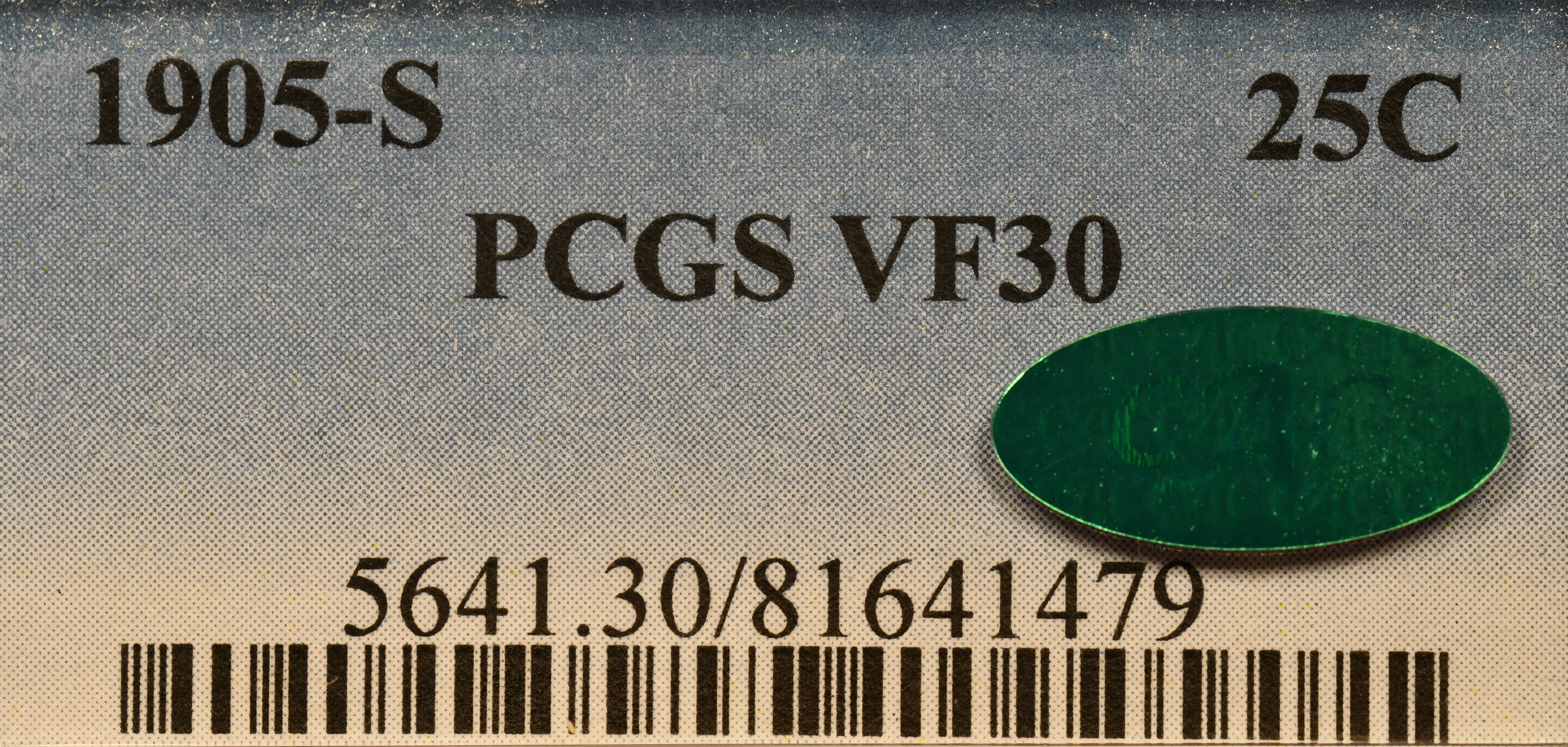
My Comments: My druthers on this coin is it is an overall nice coin per CAC, is a date I needed, but has a different obverse surface look which is "ok" along with two little potchmarks on the cheek area of Liberty. A date I needed in Sedulous #2.
A Barber Quartet is made up of Nickels, Dimes, Quarters, and Halves.
Wouldn't you rather have a nice MS64?
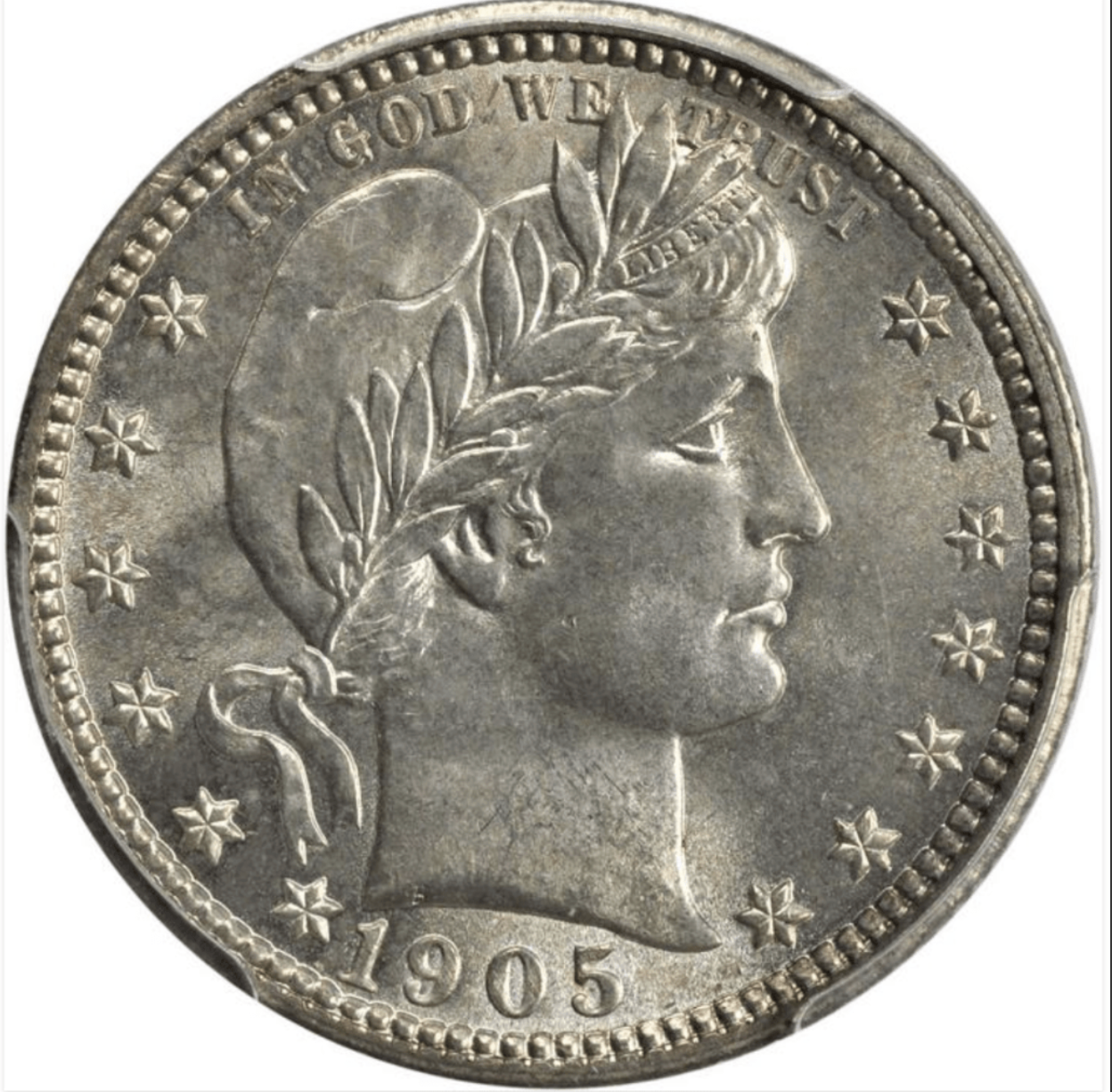
If I could only convince you to convert your date and mintmark hoard to a date set.
@DisneyFan I should... but wouldn't be able to compete with your beauty! that '05 in 64 is pristine!
A Barber Quartet is made up of Nickels, Dimes, Quarters, and Halves.
I'm always happy to find an easy on the budget nice MS64.
There was furious last second bidding on it in a rapid fire Stack's Bowers auction ten years ago. I ended up winning the coin with my bid being $100 higher than I thought. Fortunately it was undervalued by the price guides at the time and later received a CAC.
Here is even another CAC'd OKC newp:
1915-D Barber Quarter PCGS VF30 CAC
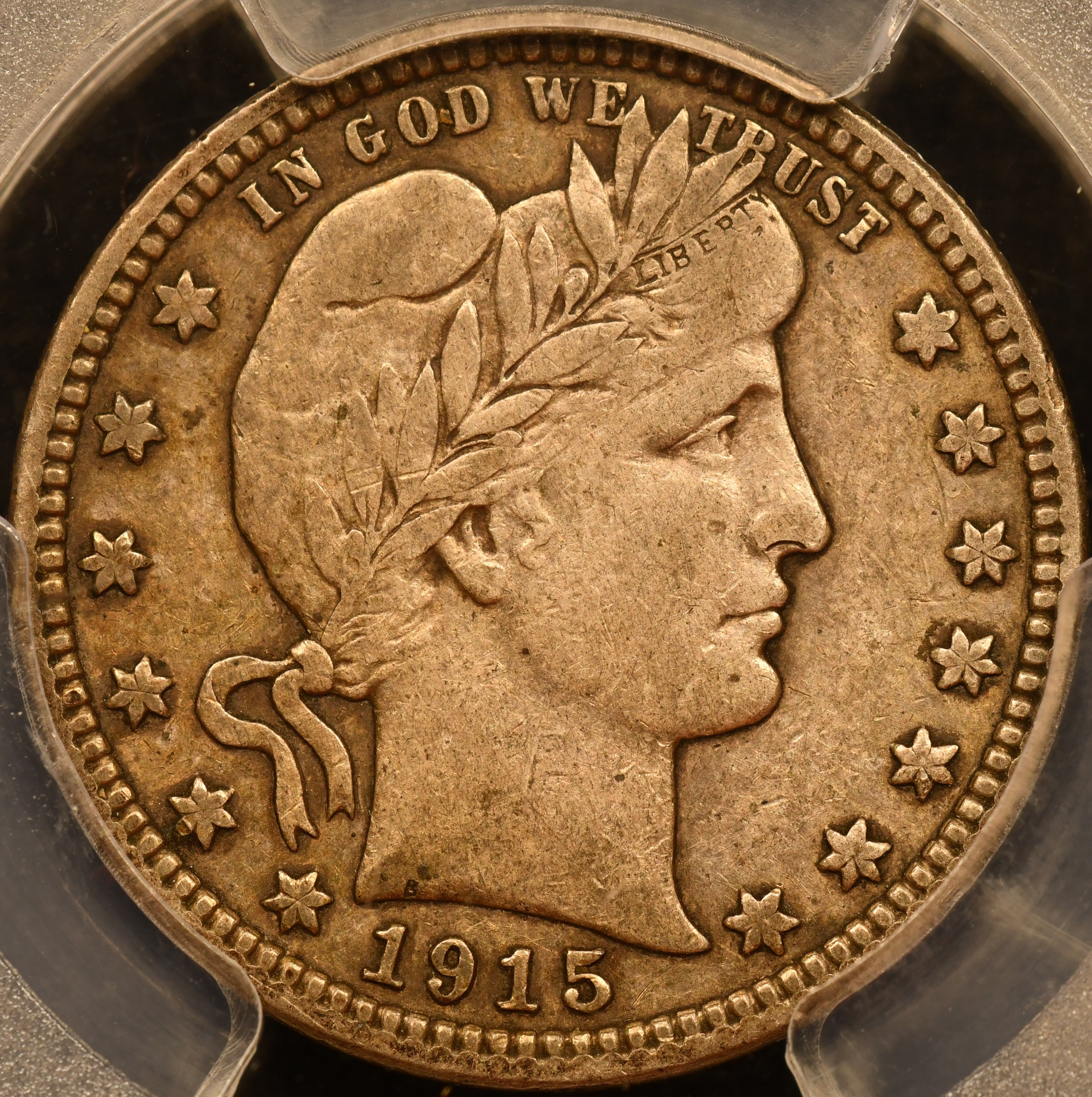
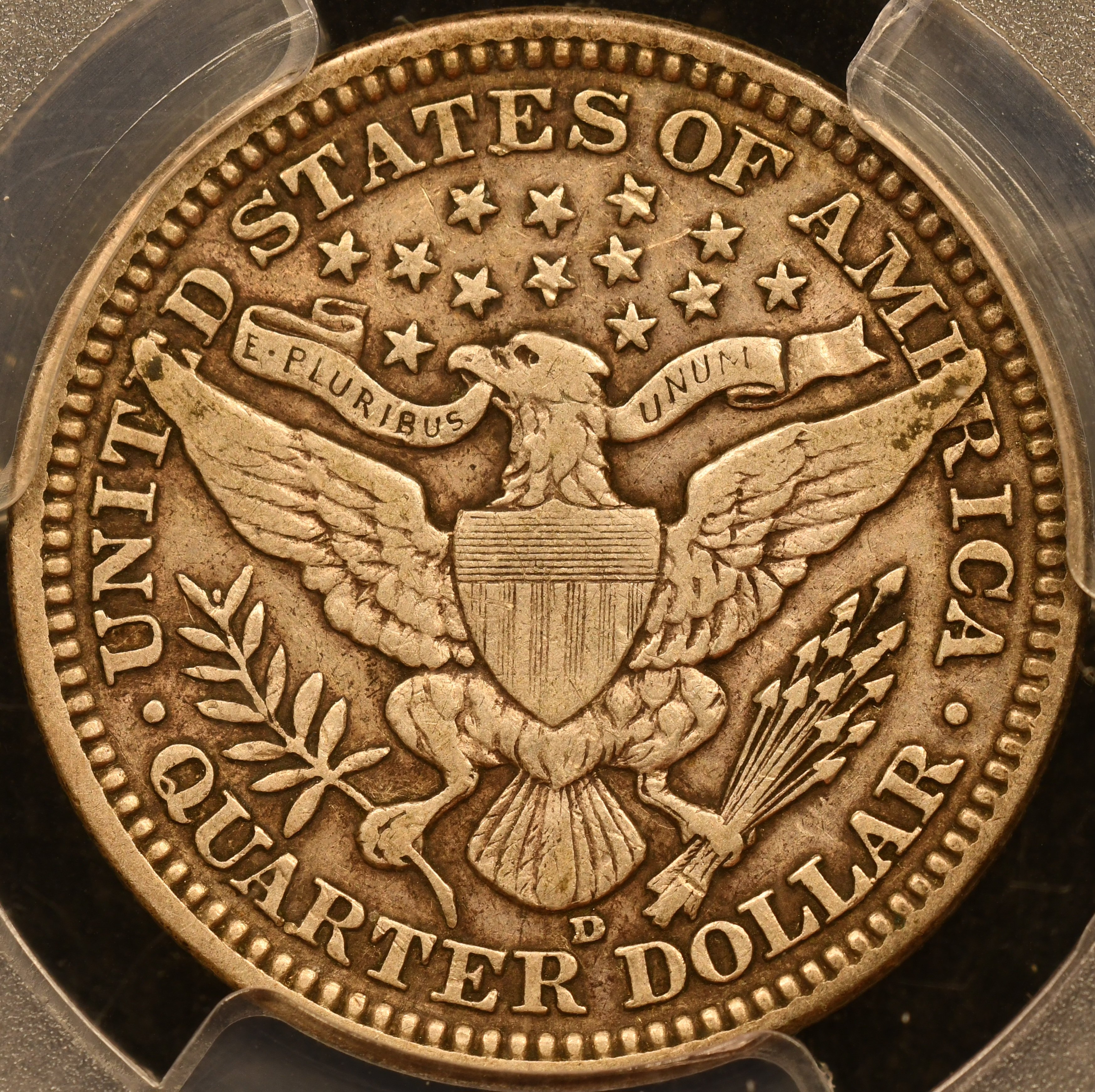
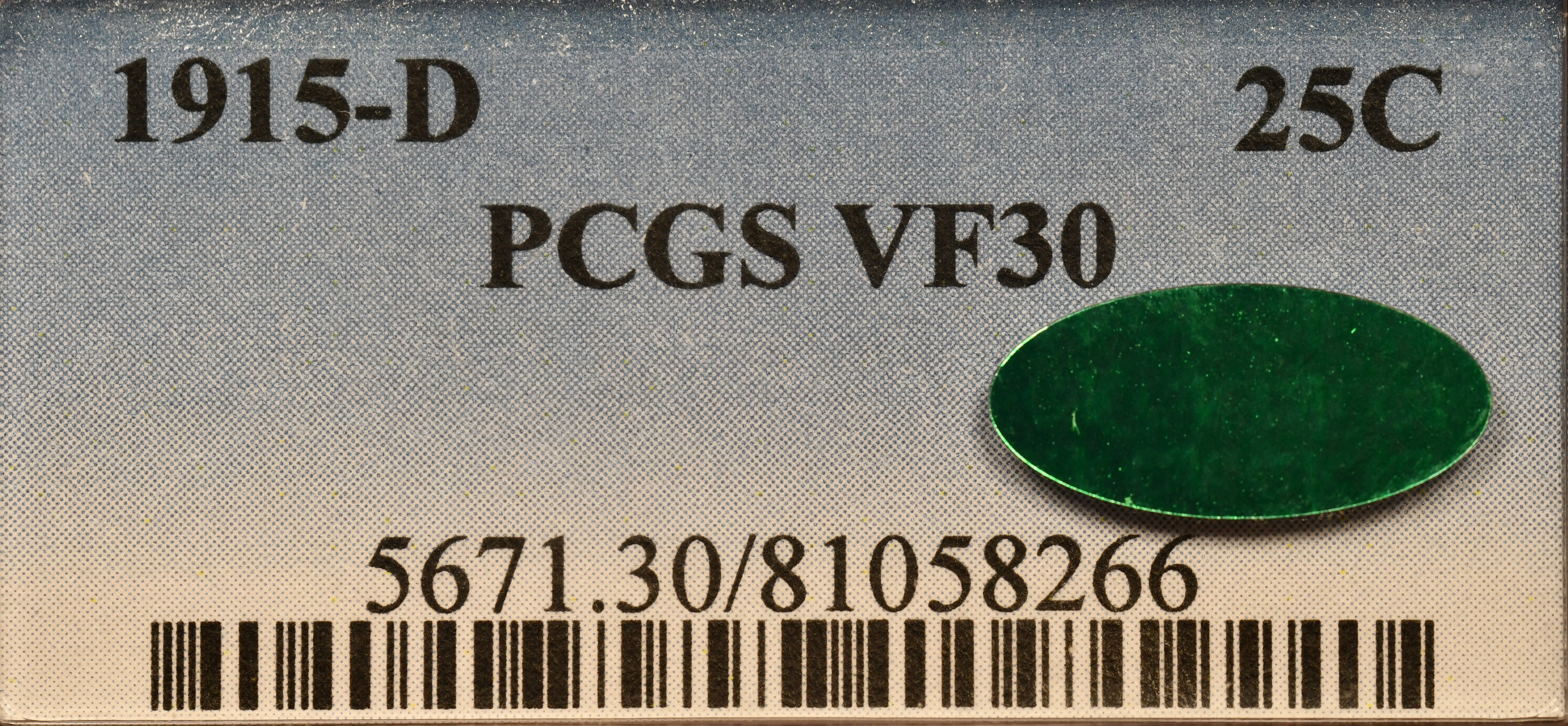
My comments: Agreeable as another pleasant-looking specimen although common. This might be closer to a consideration of Jeff's "VF29" comment if not even a 25. The light circulated patina and darker crud around the devices are in all the right places and pleasing. The obverse hits near the bottom of the headdress are not as prevalent as the 1905-S CAC'd VF30. An ever-so-slight darker field area to the viewer's left on the obverse.
I have about two more CAC'd quarter dollar coins coming up for the leftover OKC's.
A Barber Quartet is made up of Nickels, Dimes, Quarters, and Halves.
Welcome to the weekend. Here is one of my favorite OKC ANA pick-ups.
1894-S Barber Quarter PCGS VF30 CAC
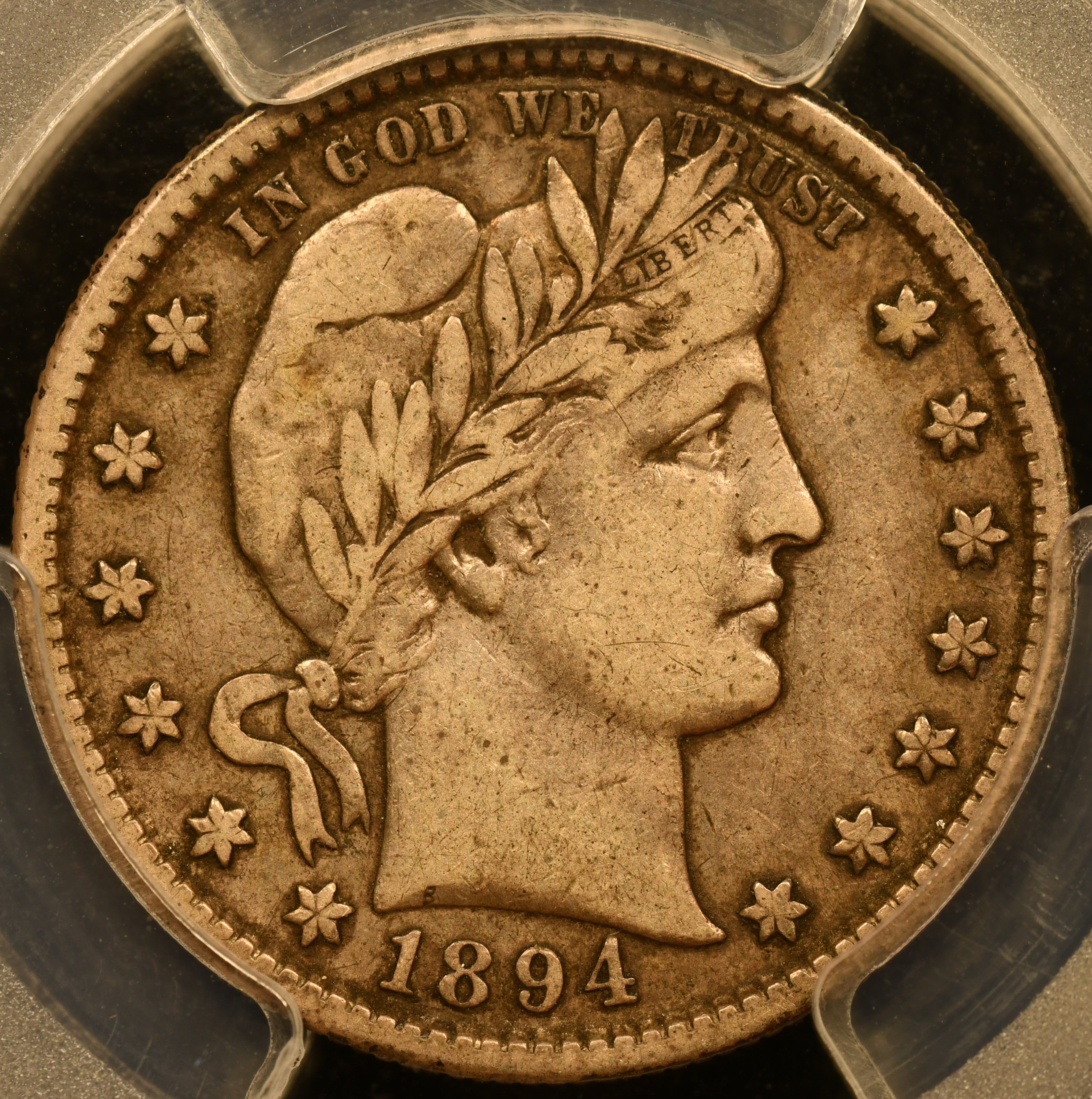
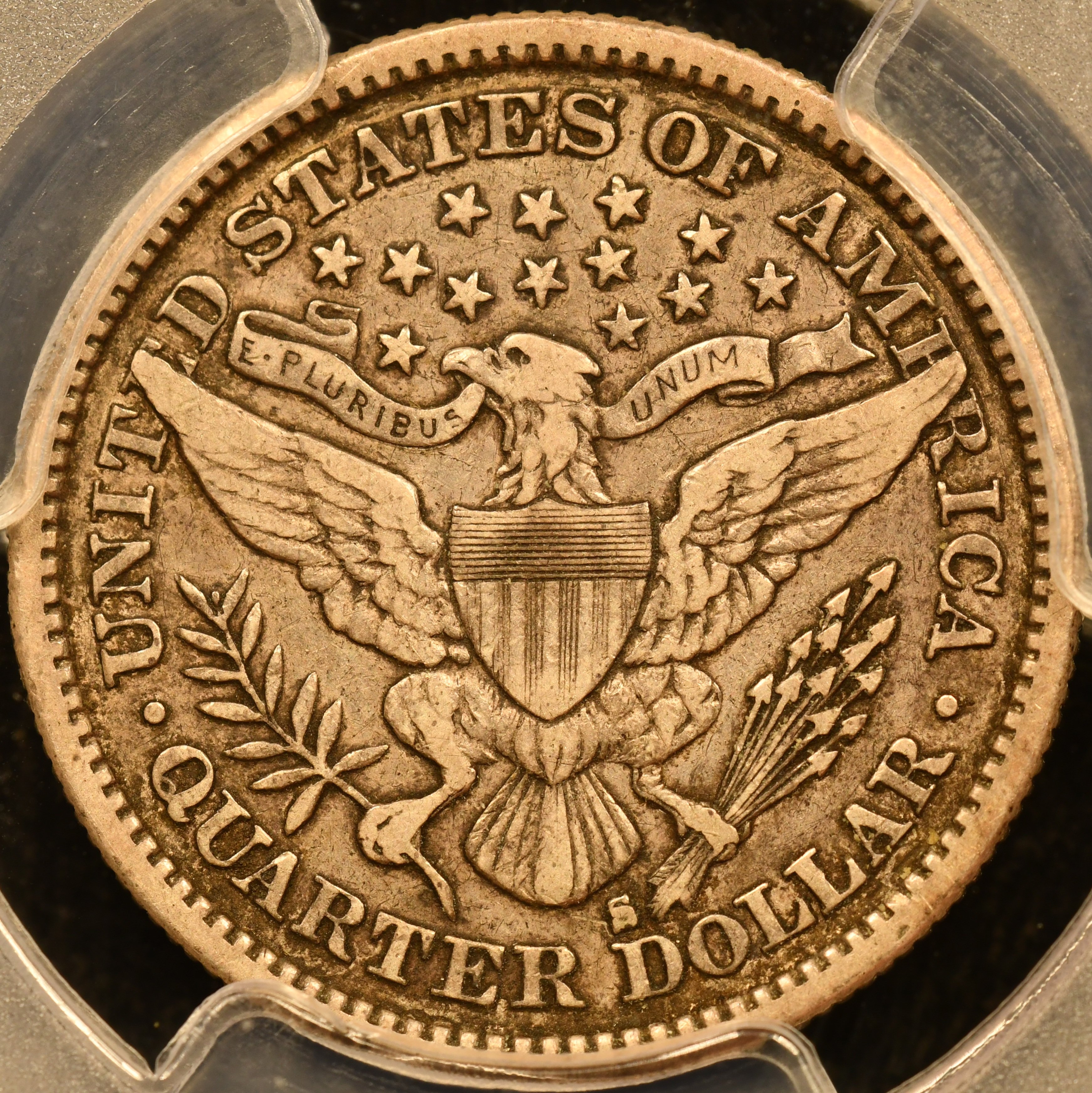
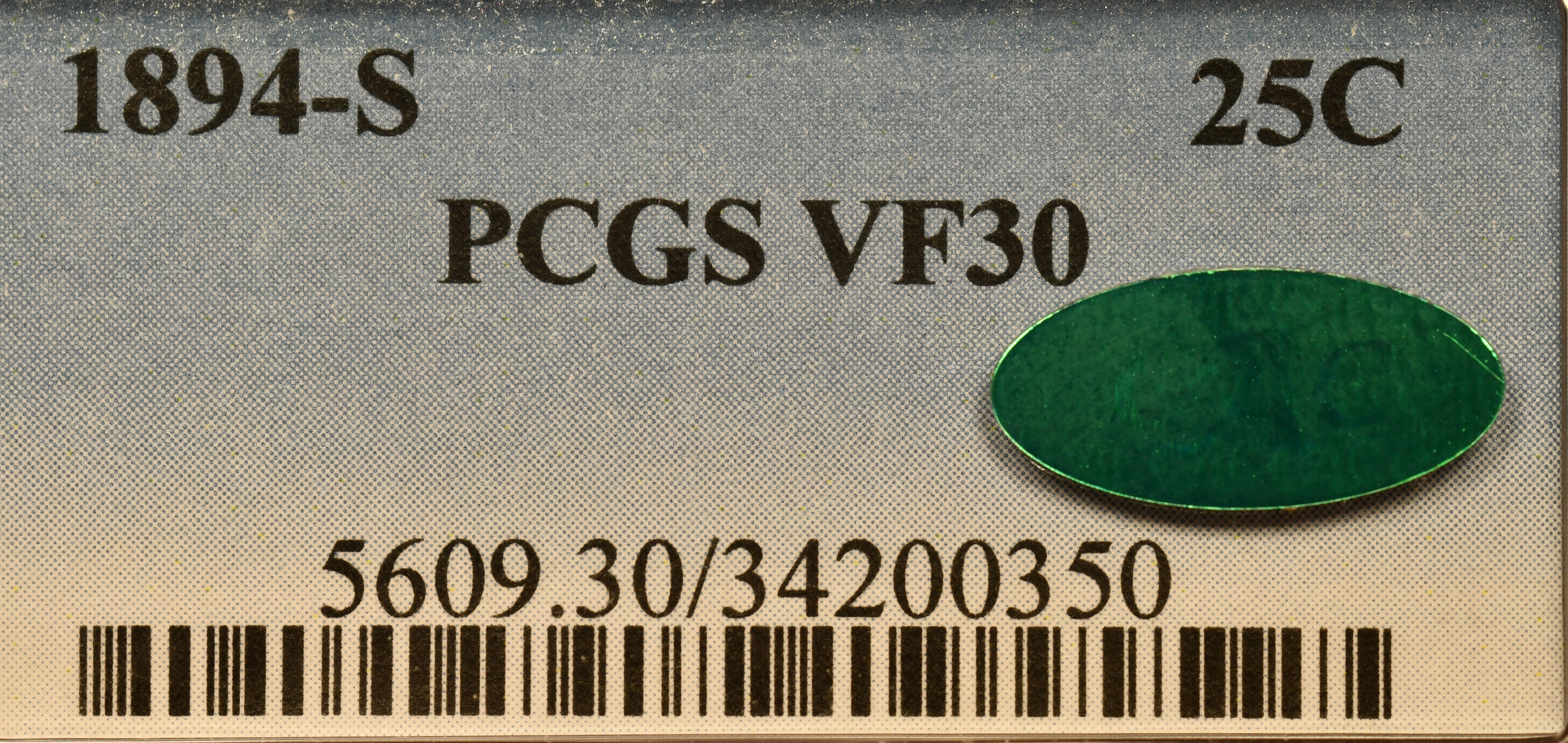
My Comments: The quality of 1894-S quarters are decent as a whole and this coin is no exception. You can see the band underneath the LIBERTY ribbon across the forehead. A lot of laurel wreath leaf detail and nice for the grade.
A Barber Quartet is made up of Nickels, Dimes, Quarters, and Halves.
That’s too nice for a 30…….
Ok, Here is my last OKC ANA Barber Quarter:
1903-P Barber Quarter PCGS VF30 CAC
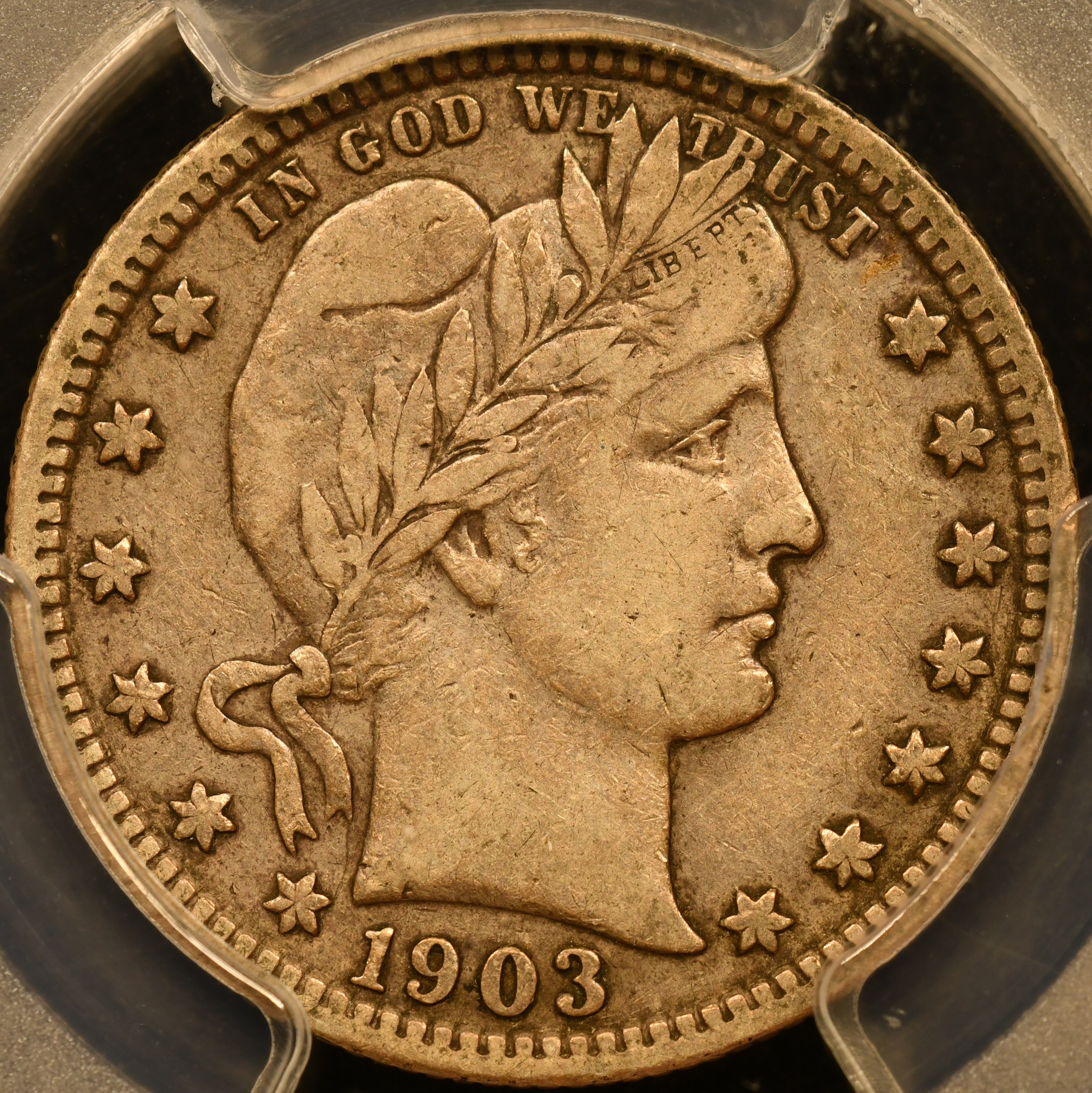
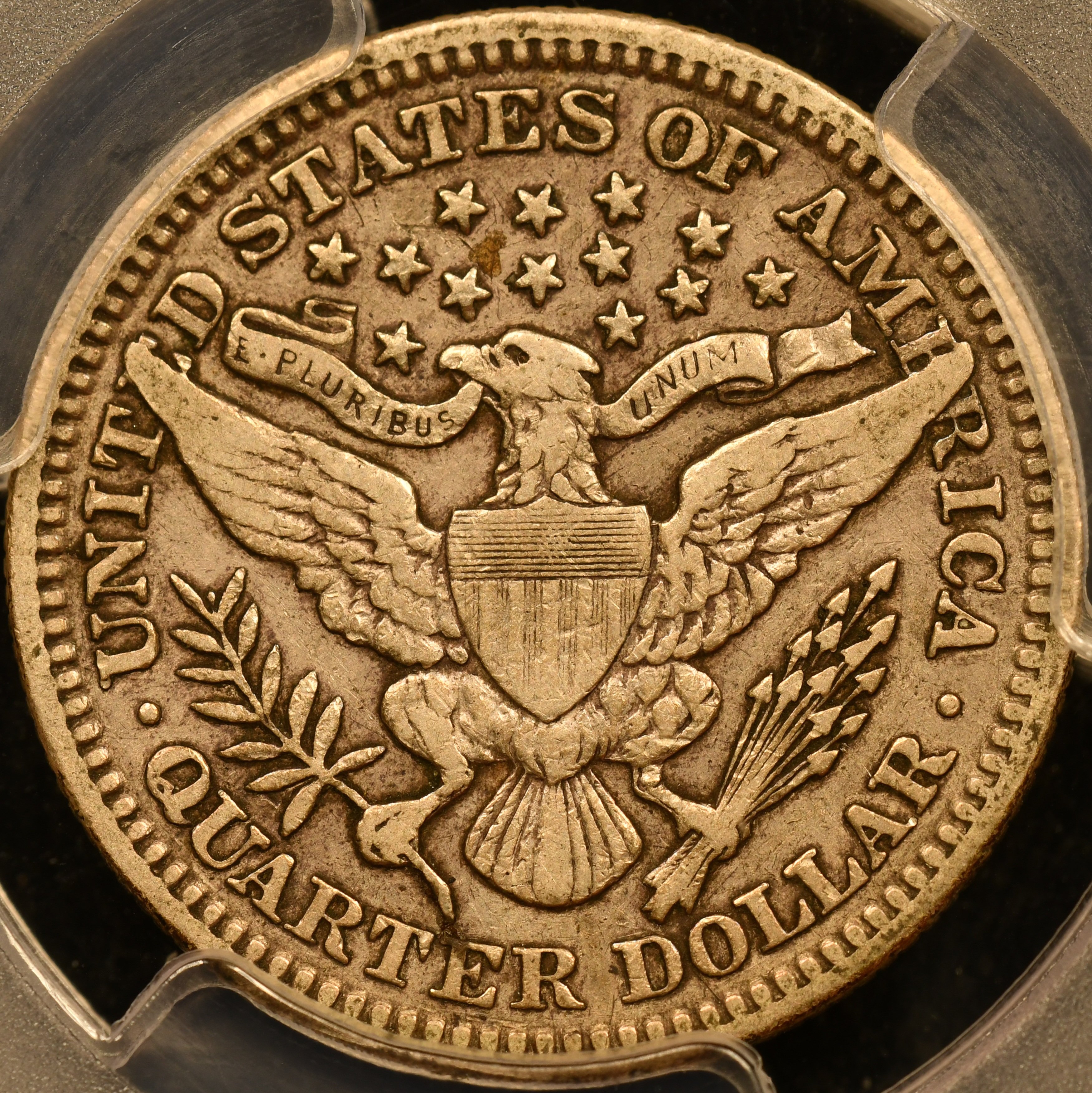
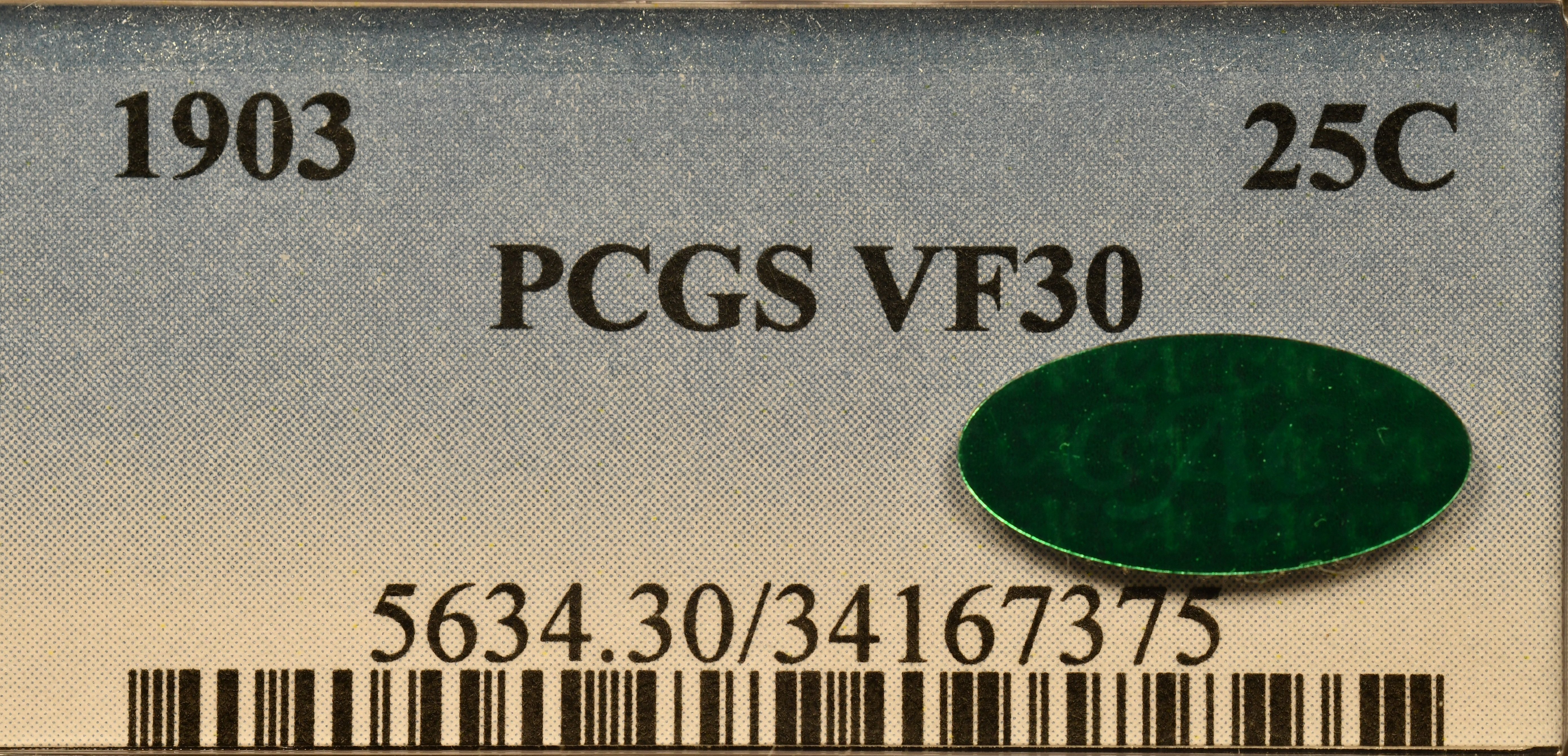
@Dave99B Dave, the last one!
A Barber Quartet is made up of Nickels, Dimes, Quarters, and Halves.
I’m beginning to think the mints only made VF 30 BQ’s with CAC stickers…
Would you believe there is only ONE VF30 1903-P at CAC and THREE 1913-Ss.
Sure. $50 CAC value. Cost of grading and CAC would be close to that. Nice coin!!!
Great look.
Reimburse the seller for grading fees and get a free quarter. Actually, it's a great addition to a Barber quarter grading set.
A Barber Quartet is made up of Nickels, Dimes, Quarters, and Halves.
POPs 1 & 2. Guess you are cornering the market in VF CAC Barber Quarters.
Hey, does anyone have any leads on a nice 1896 dime for my date set? It is the last coin I need to complete it! Could be NGC or PCGS. Would prefer MS64-66 and attractive toning is a plus.
Jason, I sent you a PM on an NGC MS64 1896-P.
A Barber Quartet is made up of Nickels, Dimes, Quarters, and Halves.
More on CAC'd VF30's...
A Barber Quartet is made up of Nickels, Dimes, Quarters, and Halves.
A couple of good Date & M/Ms there Tim
Here are some New Orleans versions...
1896-O Barber Quarter PCGS VF30 CAC
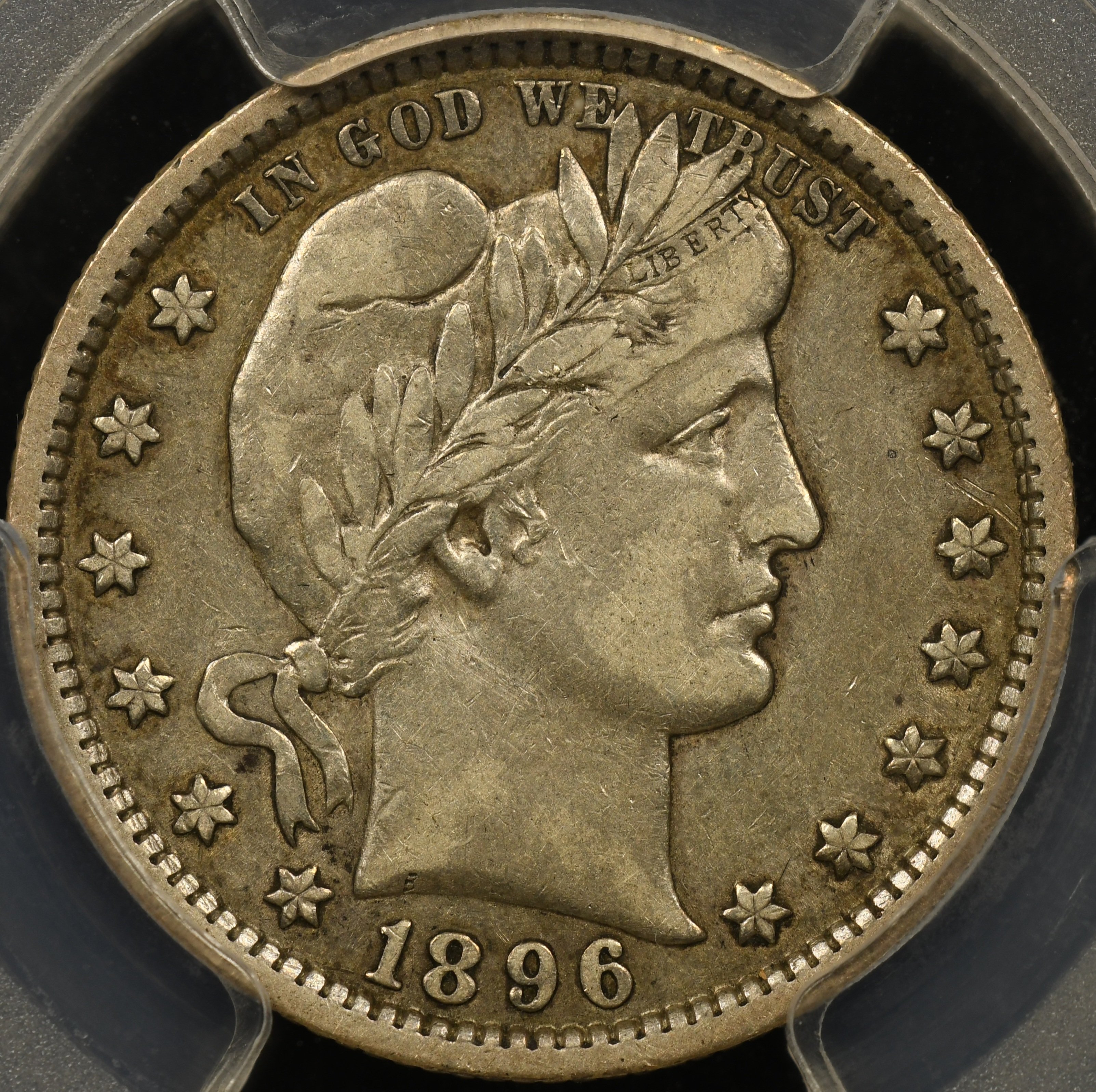
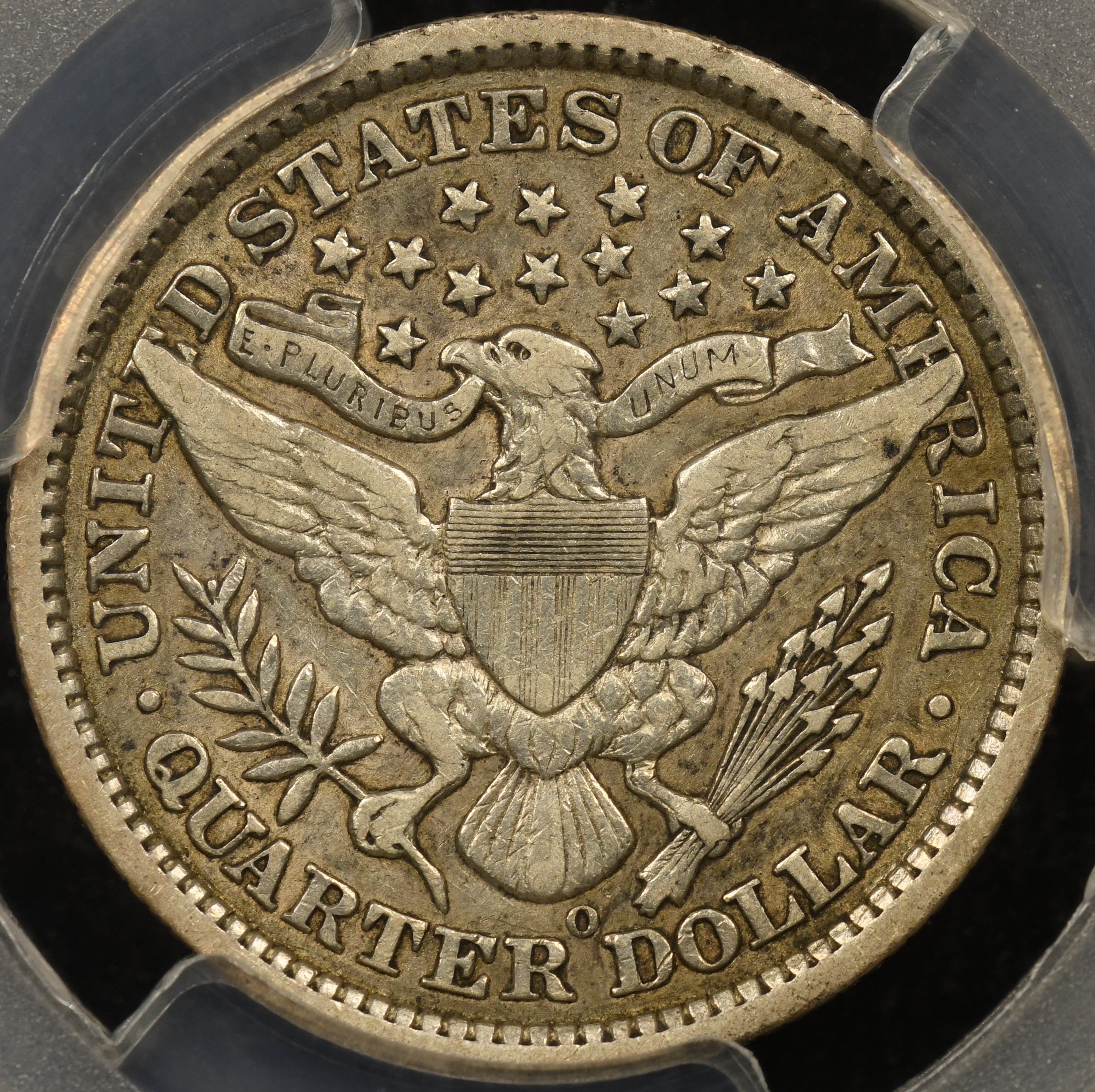
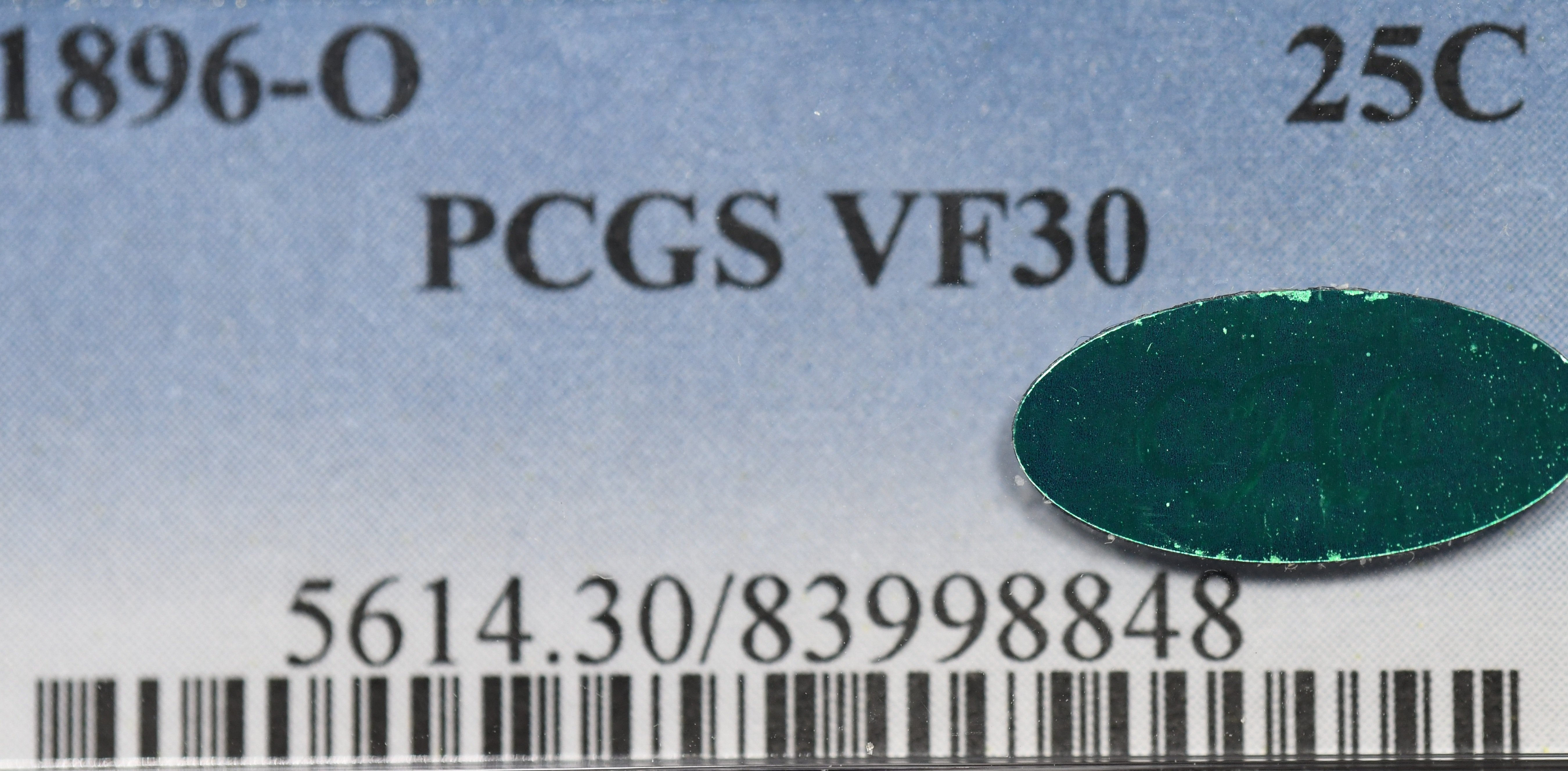
1898-O Barber Quarter PCGS VF30 CAC
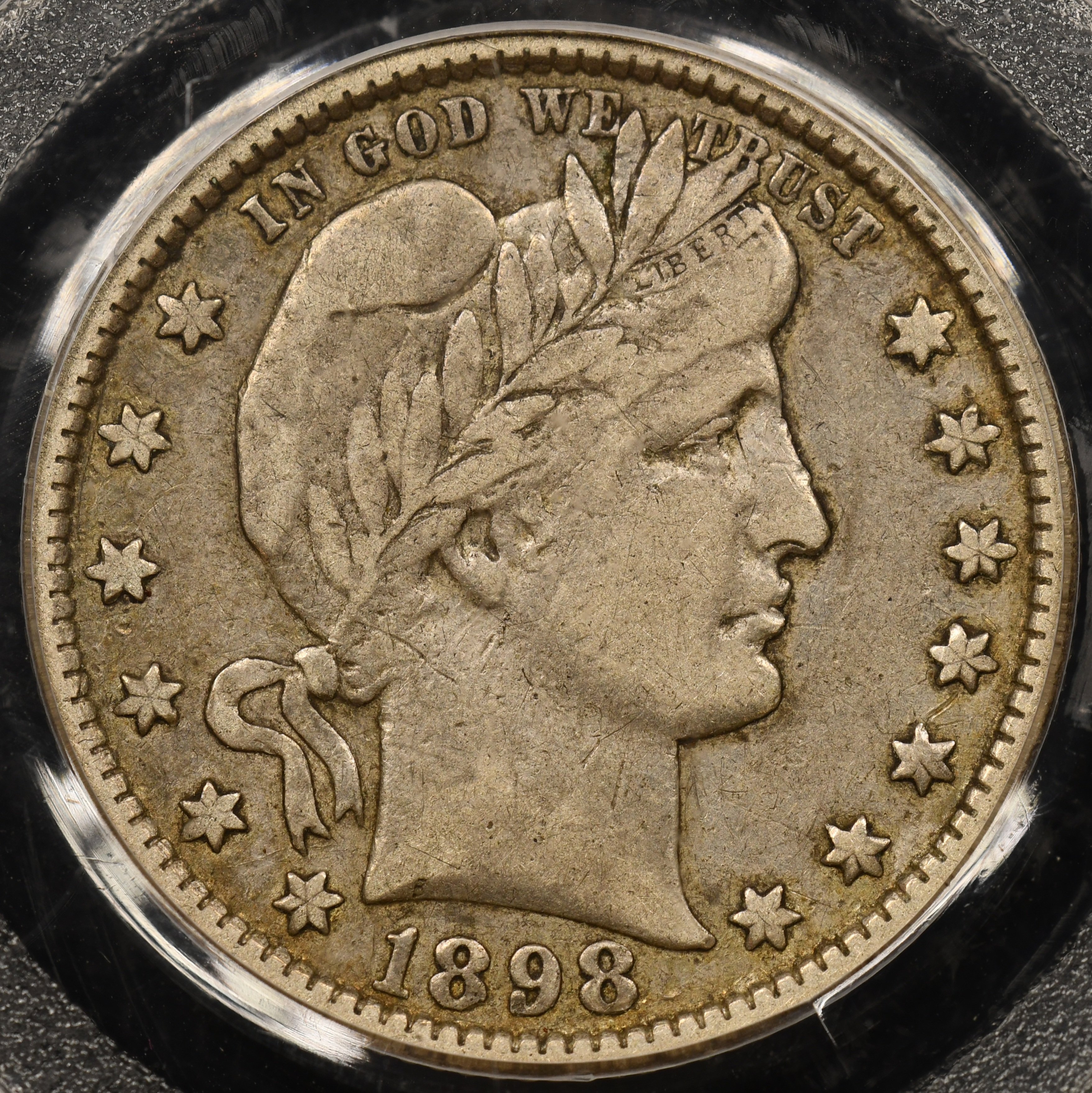
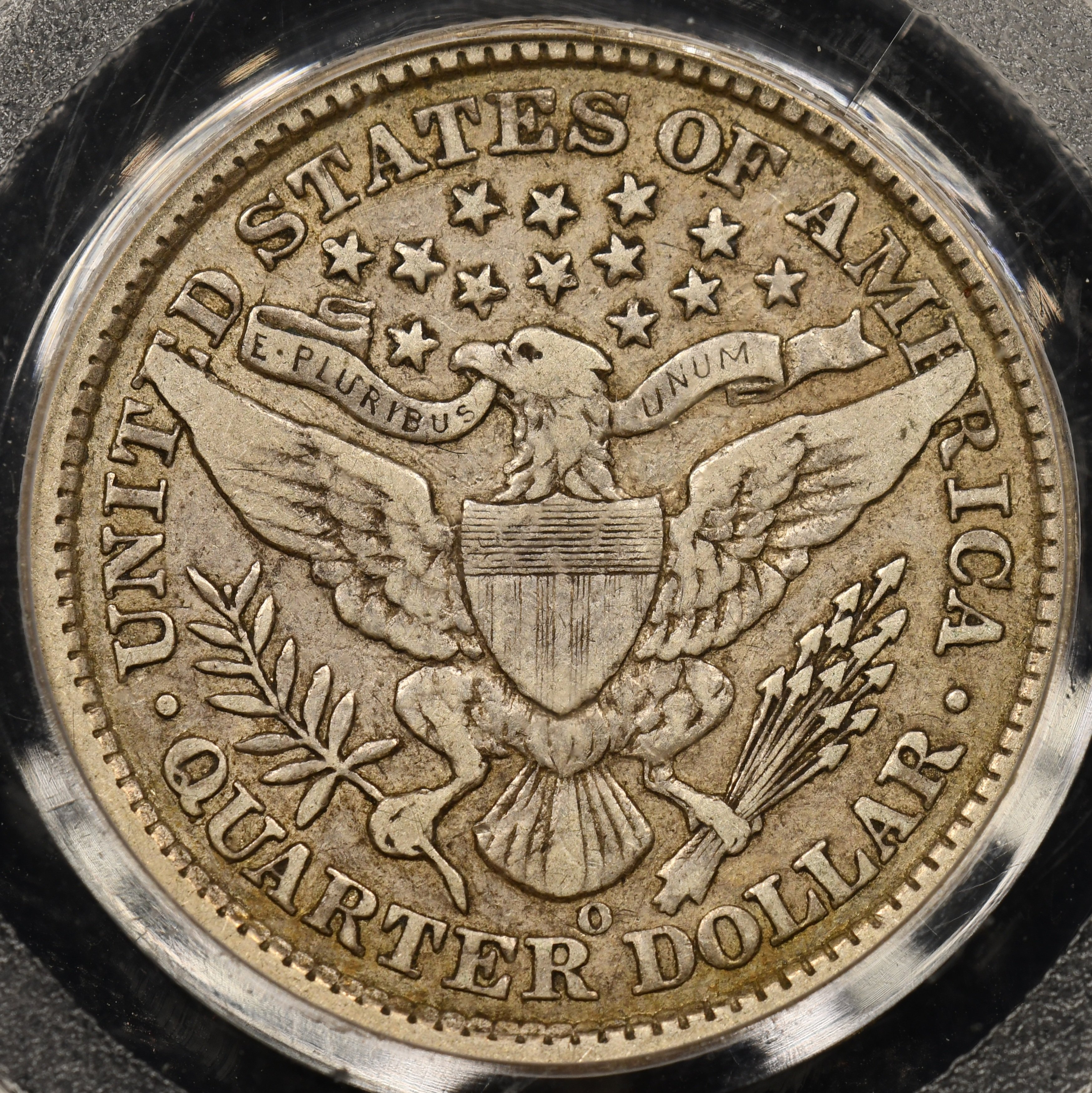
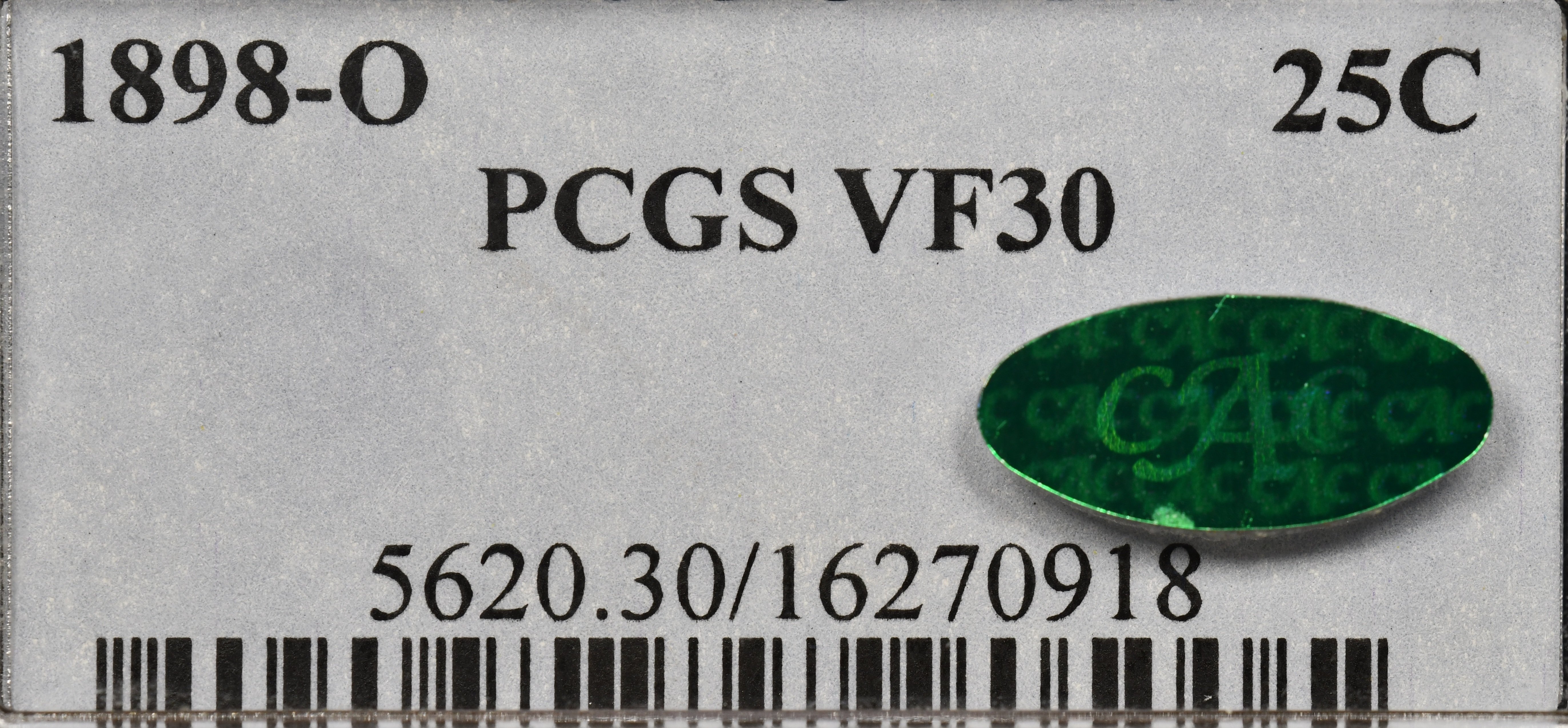
1899-O Barber Quarter PCGS VF30 CAC
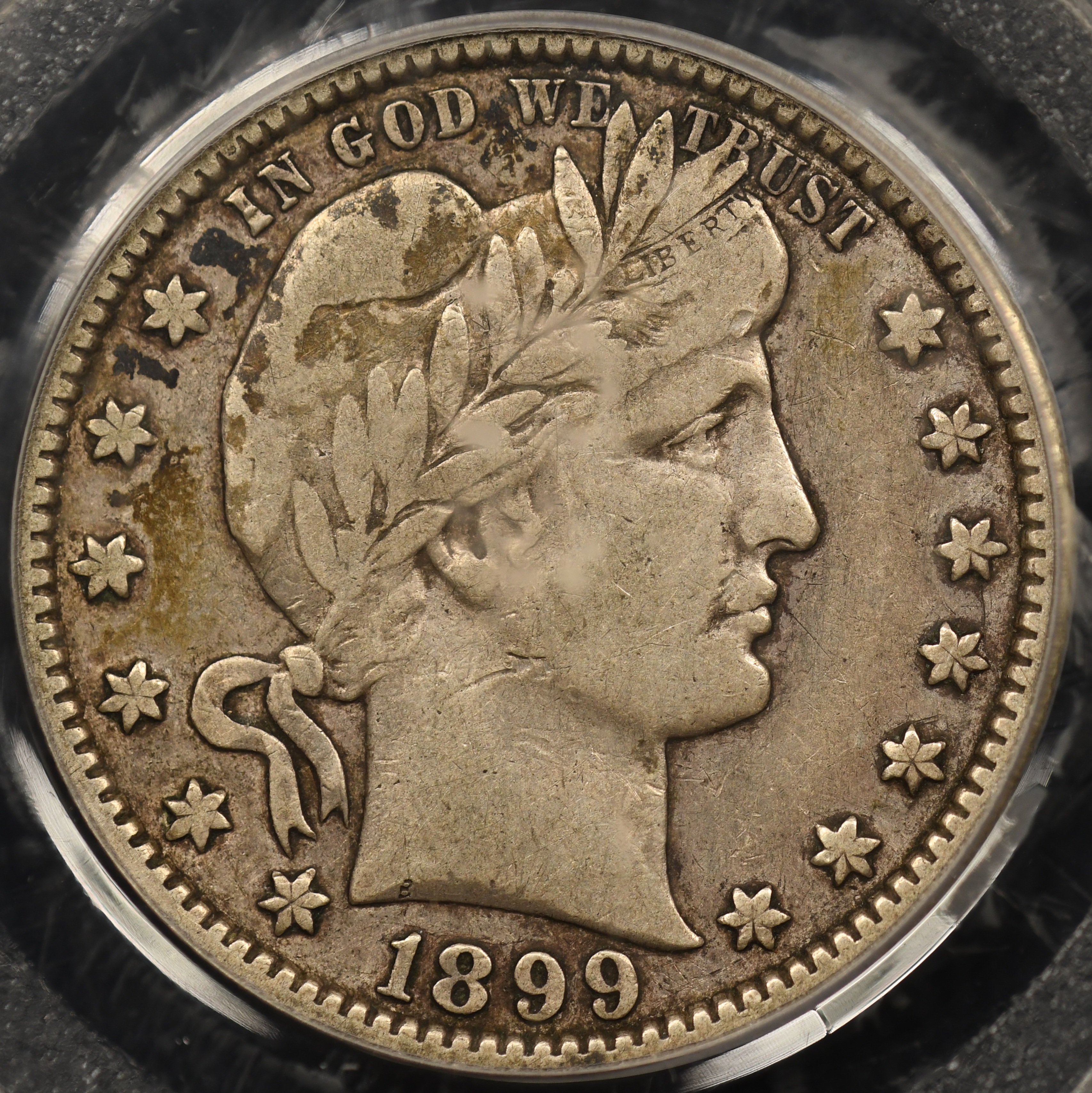
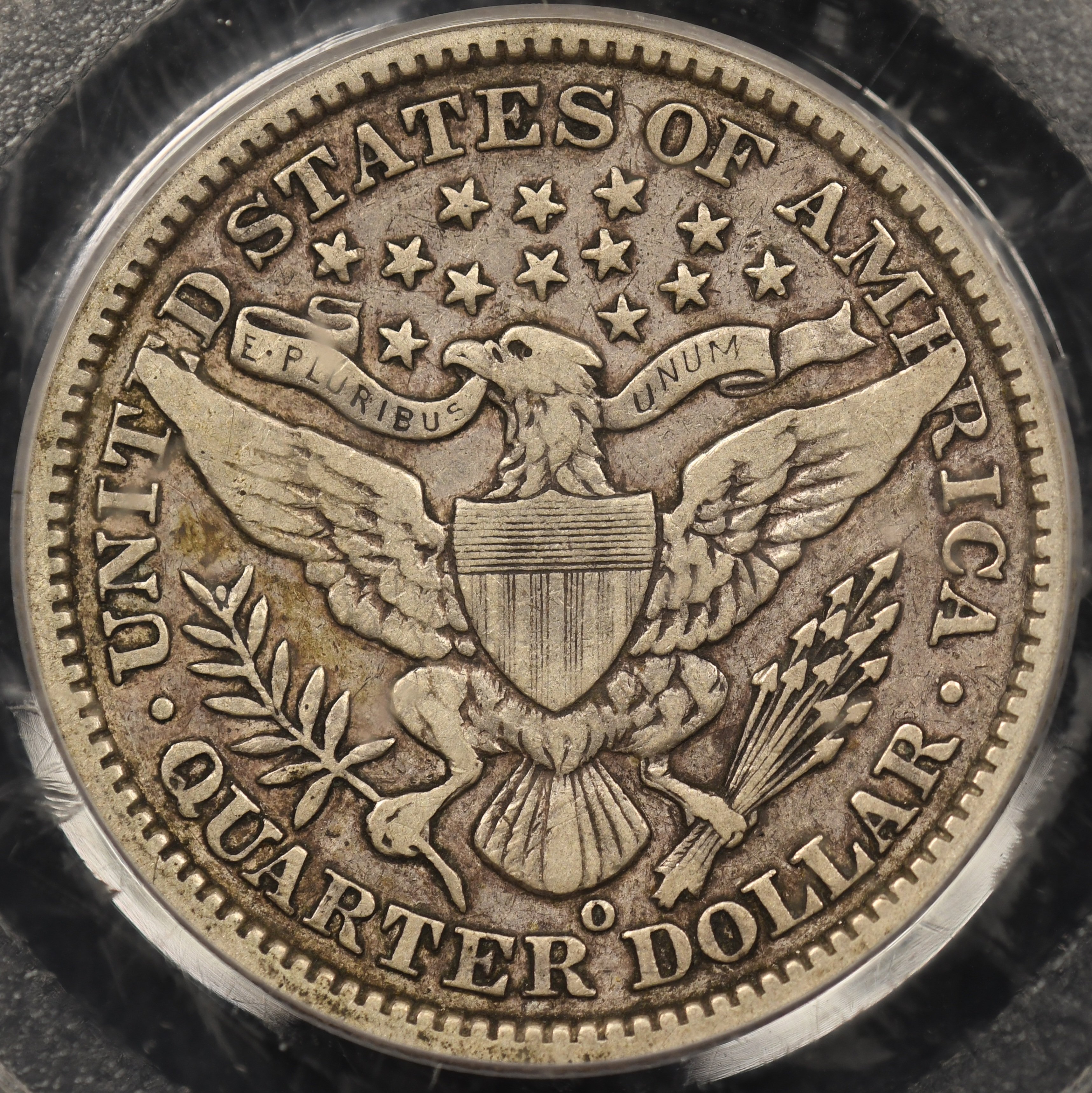
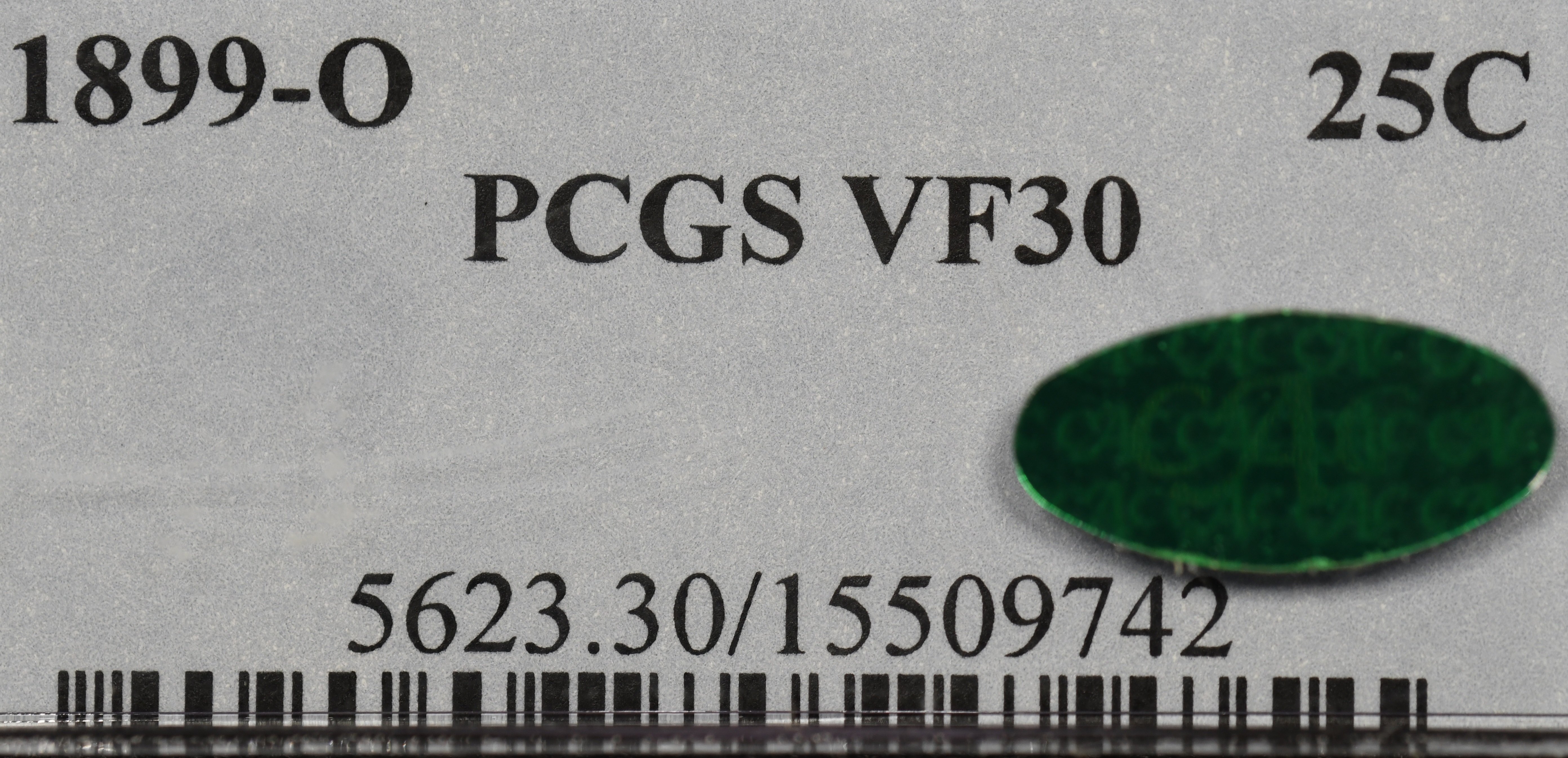
A Barber Quartet is made up of Nickels, Dimes, Quarters, and Halves.
Thanks!
A Barber Quartet is made up of Nickels, Dimes, Quarters, and Halves.